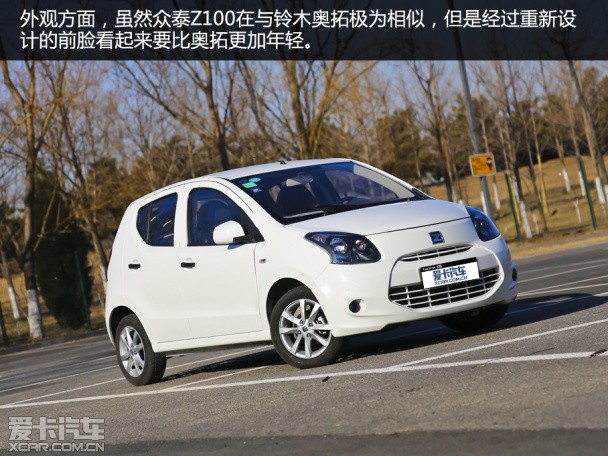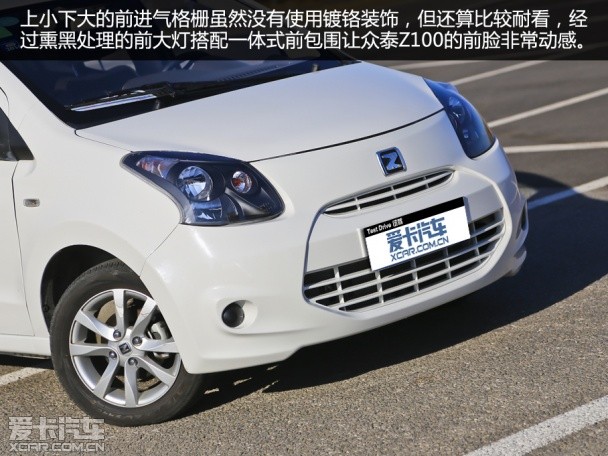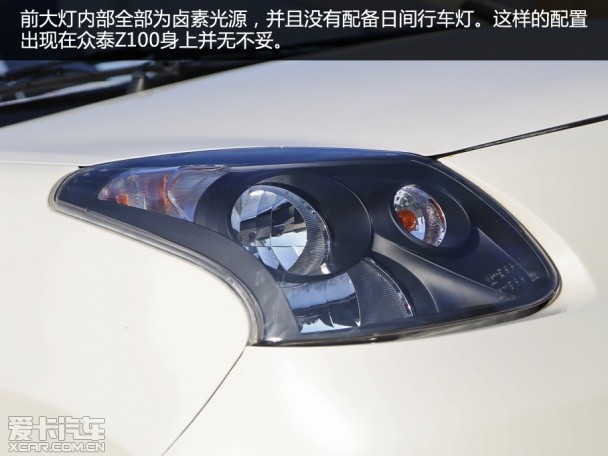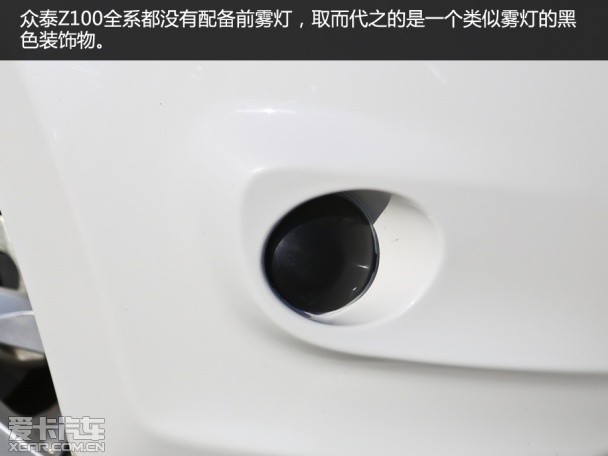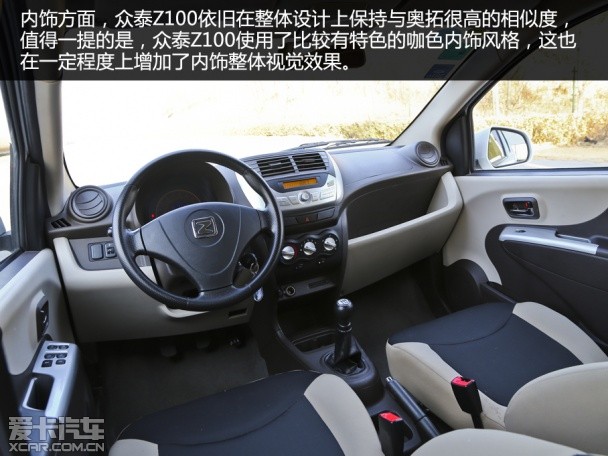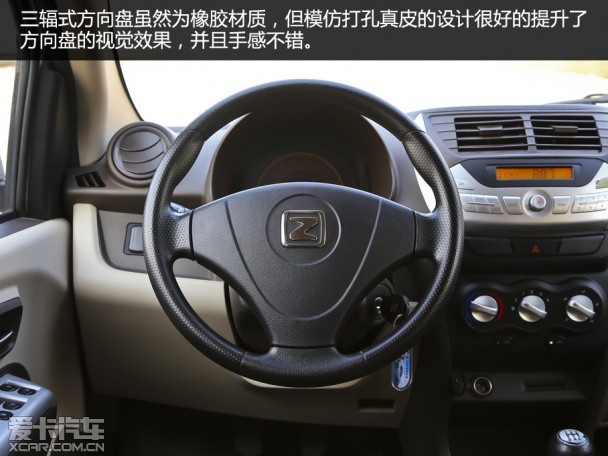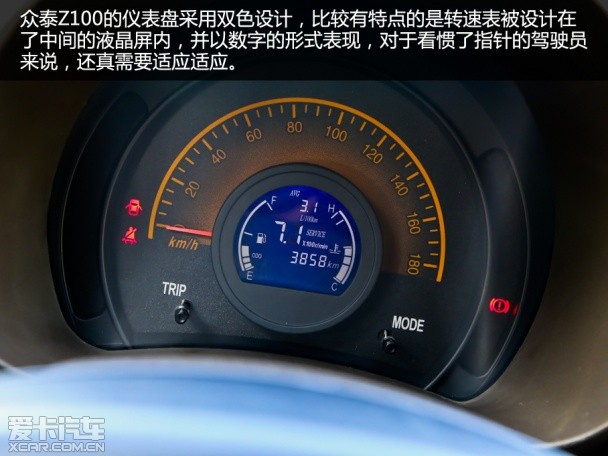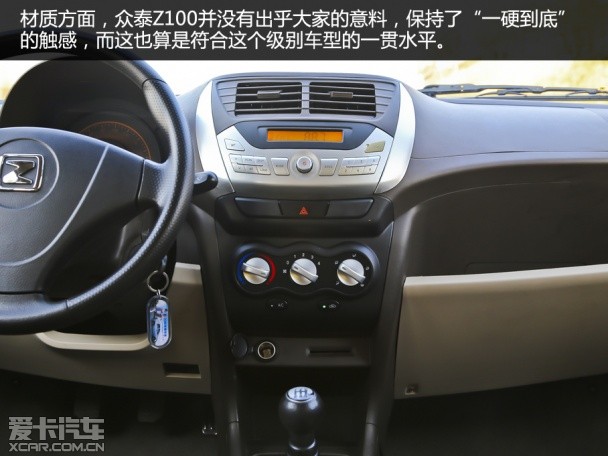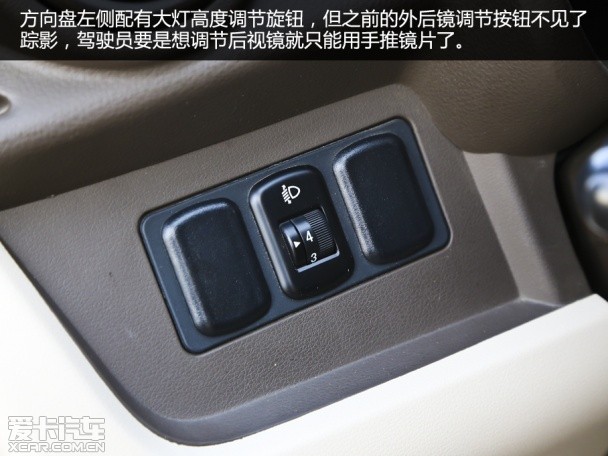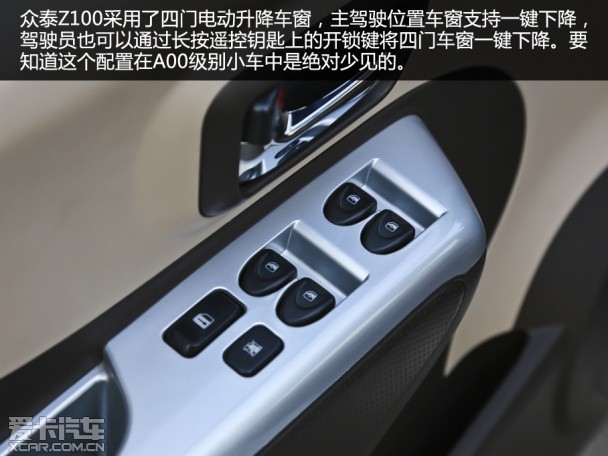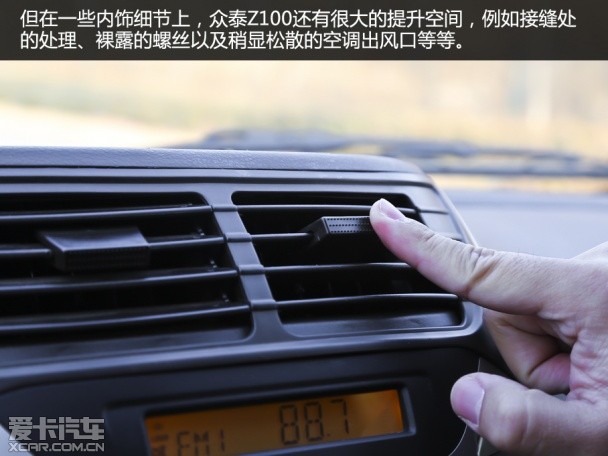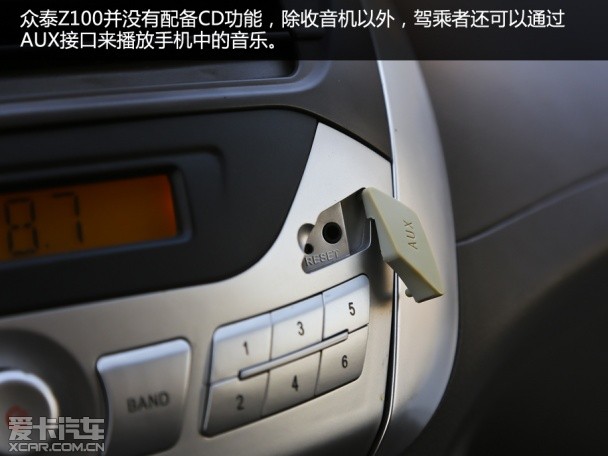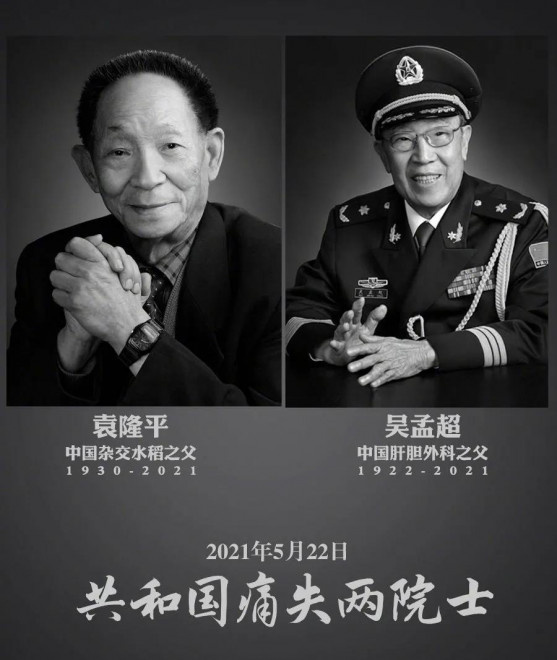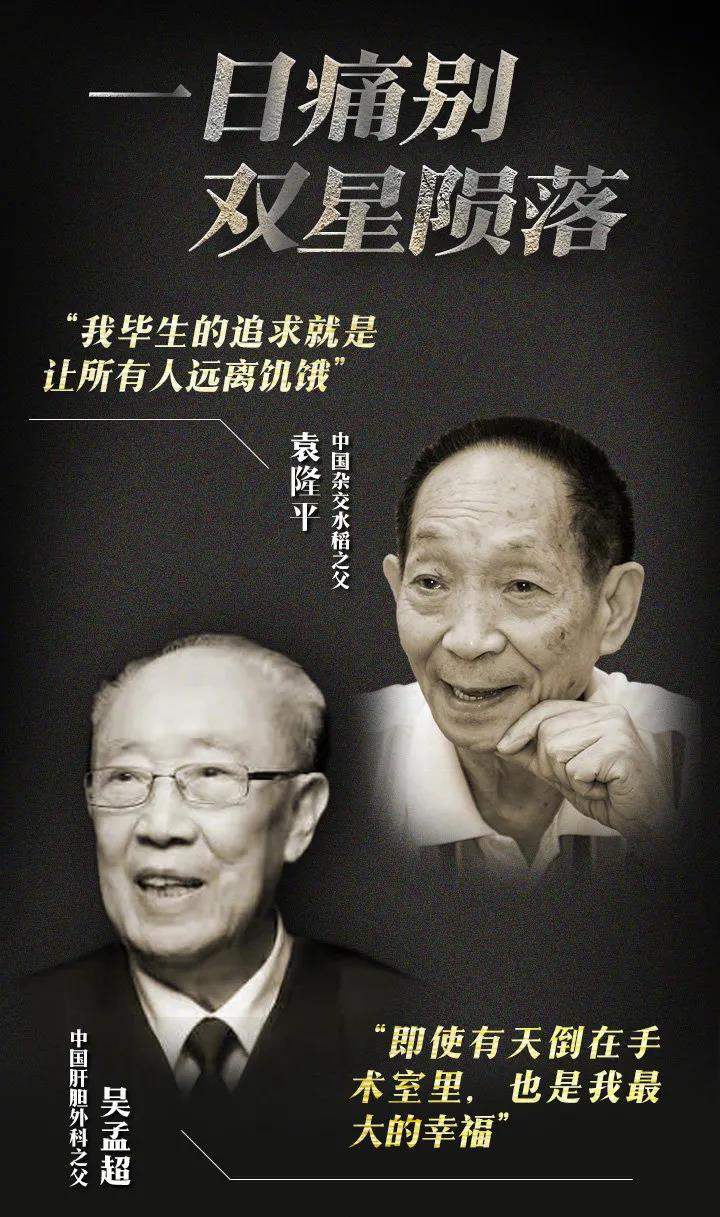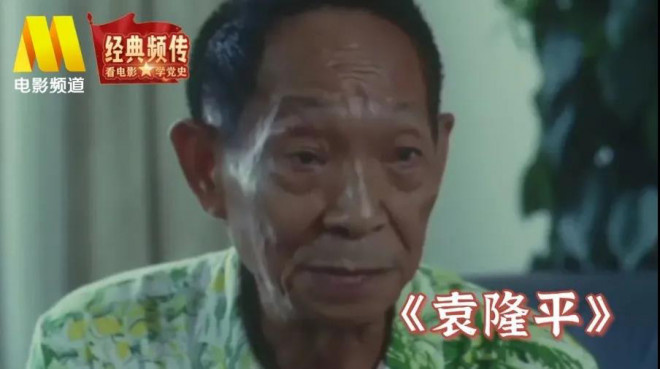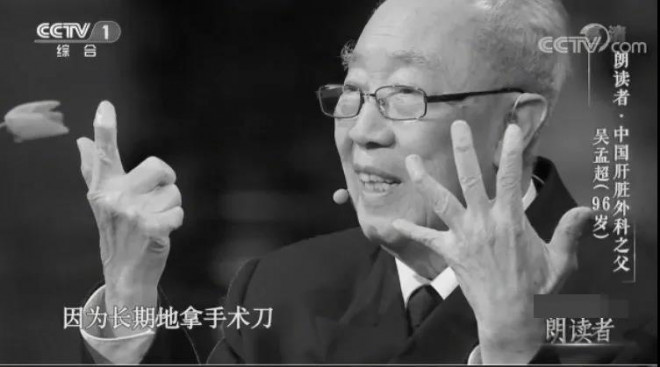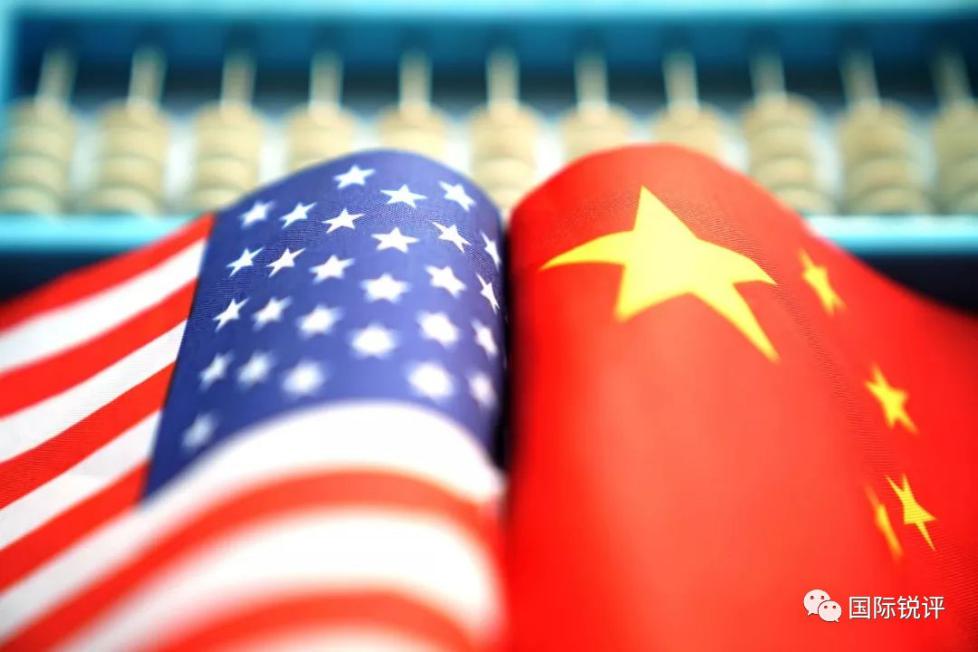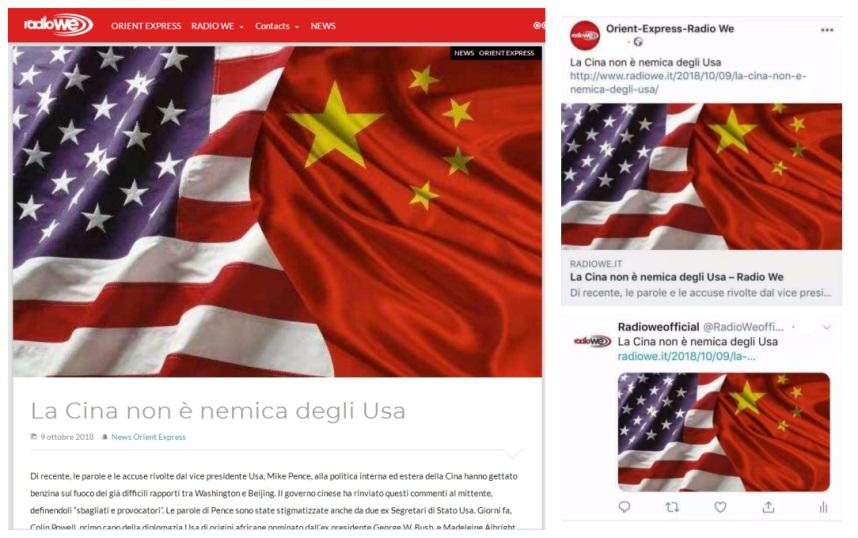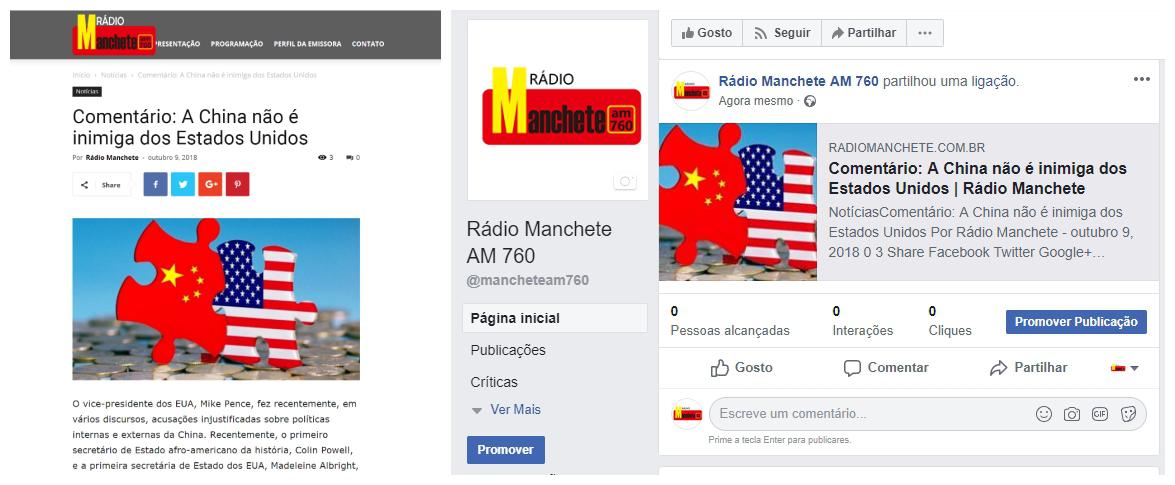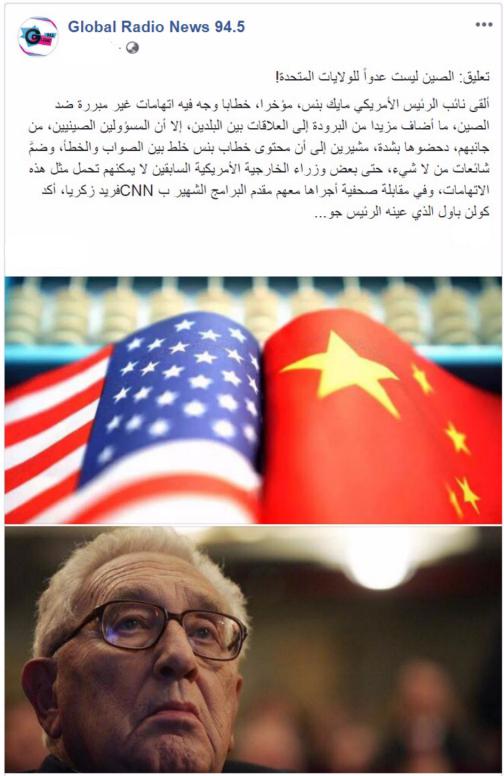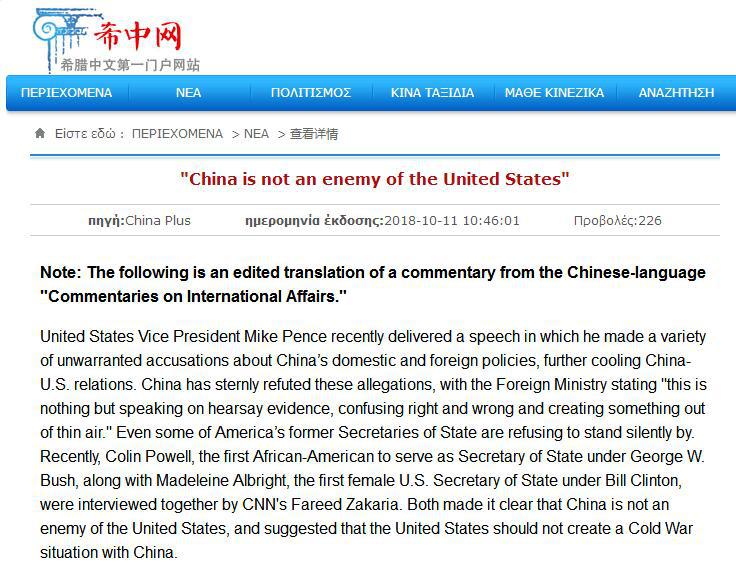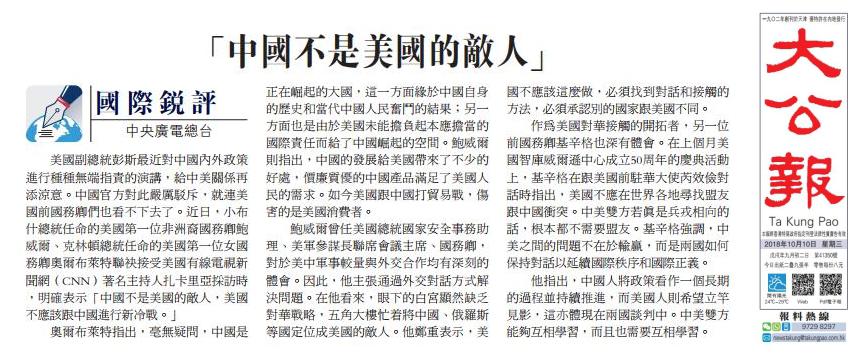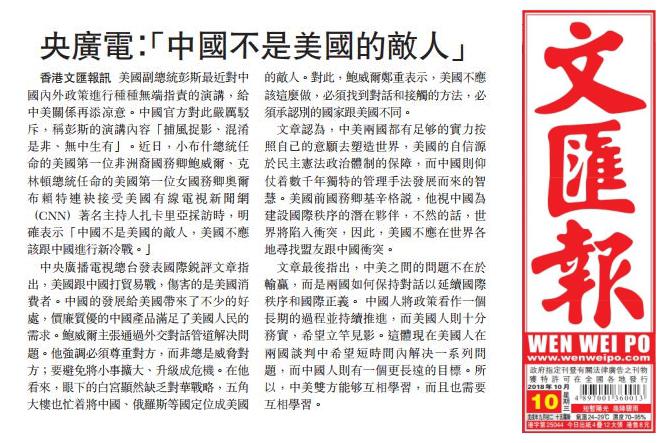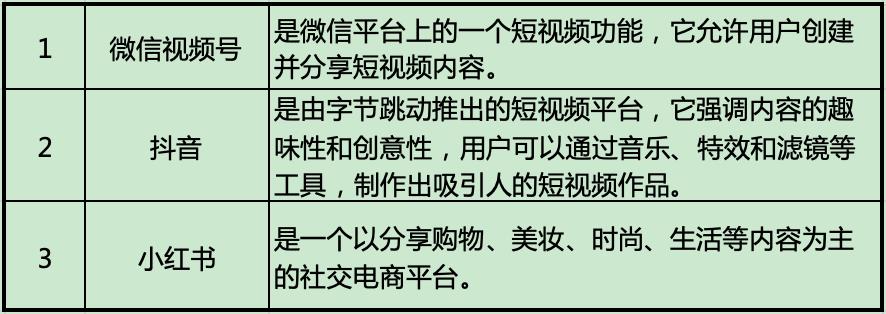State and municipal people’s governments, provincial committees, offices, departments and bureaus:
The 13th Five-Year Plan for the Development of Modern Logistics Industry in Yunnan Province and the Implementation Plan for the 13th Five-Year Plan for the Development of Modern Logistics Industry in Yunnan Province (2016-2020) have been agreed by the provincial people’s government, and are hereby printed and distributed to you. Please implement them carefully.
General Office of Yunnan Provincial People’s Government
October 21, 2016
(This piece is publicly released)
The 13th Five-Year Plan for the Development of Modern Logistics Industry in Yunnan Province
Modern logistics industry is a cross-industry, cross-department, cross-region and highly permeable compound industry that integrates transportation, warehousing, processing, distribution, freight forwarding and information industries to form a complete supply chain. It is an important part of modern service industry and a basic and strategic industry that supports the development of national economy. Accelerating the development of modern logistics industry and vigorously promoting "internet plus" efficient logistics are important measures to moderately expand total demand and promote supply-side structural reform, which is conducive to promoting employment and improving total factor productivity. It is of great significance for our province to better serve and integrate into the national development strategy, accelerate the optimization and upgrading of industrial structure, accelerate the transformation of development mode, maintain stable and healthy economic development, and achieve the goal of building a well-off society in an all-round way in synchronization with the whole country as scheduled.
In order to speed up the supply-side structural reform and promote the development of modern logistics industry in our province, according to the spirit of the important speech made by the Party’s 18th and 3rd, 4th and 5th Plenary Sessions of the 18th CPC Central Committee and the General Secretary of the Supreme Leader, and in accordance with "the State Council on Printing and Distributing Logistics Industry"Notice on Exhibition of Medium and Long-term Planning (2014-2020) (Guo Fa [2014] No.42), Notice of the National Development and Reform Commission on Printing and Distributing the Implementation Opinions on Efficient Logistics in internet plus (Development and Reform Economic and Trade [2016] No.1647), Outline of the 13th Five-Year Plan for National Economic and Social Development in Yunnan Province, Opinions of Yunnan Provincial People’s Government of CPC on Promoting the Development of Key Industries (YWF [2016] No.11), Notice of Yunnan Provincial People’s Government on Printing and Distributing the Implementation Plan for Implementing the National Medium-and Long-Term Plan for the Development of Logistics Industry (2014-2020) in Yunnan Province (YWF [2015] No.28), etc.
I. Planning background
(A) Development status
Since the "Twelfth Five-Year Plan", the provincial party committee and government have attached great importance to the development of modern logistics industry. By implementing the strategy of "circulating vigorously", making scientific plans, increasing capital investment and paying close attention to the implementation of projects, a series of policies and measures to promote the development of logistics industry have been introduced, which has promoted the rapid development of logistics industry.
1. The logistics industry is developing rapidly. During the "Twelfth Five-Year Plan" period, the province’s logistics industry developed well, with the total social logistics increasing by 14.3% and the added value of the logistics industry increasing by 13.5% annually. Cumulative freight volume increased by 48.3% year-on-year, and cumulative cargo turnover increased by 65.35% year-on-year; The number of people employed in the logistics industry has increased by about 10% annually.
2. The infrastructure network has been continuously improved. During the "Twelfth Five-Year Plan" period, our province officially started the construction of five infrastructure networks, including road network, aviation network, energy security network, water network and Internet, which laid a solid foundation for the development of modern logistics industry. By the end of the "Twelfth Five-Year Plan", the railway operating mileage was nearly 3,000 kilometers, and the construction of the railway skeleton network of "eight out of the province and five out of the country" was accelerating; The highway mileage is 236,000 kilometers, including 4,005 kilometers of expressways, and the main skeleton network of "seven out of the province and five out of the country" with Kunming as the center has basically taken shape; Operating 13 airports, opening 366 departure routes and 137 navigable cities; The new inland waterway has a navigation mileage of 1090 kilometers, with a total navigation mileage of 4200 kilometers; The construction of China-Myanmar crude oil pipeline and "three dry and one product pipeline" entered the final stage, and the construction of natural gas branch pipeline was comprehensively promoted; The total installed power in the province is 72.57 million kilowatts, of which the installed renewable energy is close to 80%, and the national clean energy base is taking shape; Internet broadband access users reached 5.4 million, and the 4G mobile communication network achieved full coverage of towns (streets) and extended to administrative villages.
3. The construction of logistics nodes has achieved remarkable results. During the Twelfth Five-Year Plan period, the function of Kunming as an international logistics node city was further enhanced, and the construction of logistics parks such as Kunming Railway Container Logistics Center achieved remarkable results. The construction of a number of port-type logistics parks has been accelerated. Yunnan Tengjun land port, Hekou Port Traffic Logistics Park, Jinghong Mengyang International Logistics Trade Center and Ruili Freight Center have been included in the Intergovernmental Agreement on Dry Ports and become important international logistics nodes. The layout of professional logistics centers such as Kunming Flower Logistics Center, Yuxi Tobacco Logistics Center and Qujing Agricultural Products Cold Chain Logistics Center has gradually taken shape.
4. The main body of logistics industry has developed rapidly. During the "Twelfth Five-Year Plan" period, logistics enterprises developed rapidly and their scale continued to grow. By the end of the Twelfth Five-Year Plan, there were more than 14,000 logistics enterprises in the province, including 1 5A-level logistics enterprise, 11 4A-level logistics enterprises, 20 3A-level logistics enterprises and 10 2A-level logistics enterprises, and 206 international freight forwarding enterprises.
5. Technical and equipment conditions have improved. With the acceleration of the construction of logistics public information platform, the intelligent transportation logistics public information platform and the electronic port customs clearance service platform have been basically completed. Bar code, radio frequency technology, geographic information system, Beidou navigation system and global positioning system, transportation management system, warehouse management system, enterprise resource planning and other logistics information technologies are gradually popularized and applied in logistics enterprises.
On the whole, the modern logistics industry in our province has entered a critical stage of comprehensive upgrading and development, but the problems of low development level and relatively extensive development mode still exist, which are mainly manifested as follows: First, the overall scale of the industry is small, the service capacity is not high, the efficiency is low, and the supporting role for industrial development is not enough. Second, the logistics infrastructure network needs to be improved, and the planning and construction of logistics parks and logistics centers are not reasonable and there are structural contradictions. Third, there is a lack of leading logistics enterprises, and the phenomenon of scattered, small and weak logistics enterprises is widespread. Fourth, the degree of logistics informatization and standardization is not high, and the application degree of automation equipment is low. Fifth, the quality of logistics practitioners is not high, and there is a lack of professionals. Sixth, the system and mechanism of logistics industry development are not perfect, and the policies, regulations and statistical systems are not perfect.
(2) Facing the situation
1. The implementation of national development strategy brings great opportunities for the development of modern logistics industry in our province. Active service and integration into national development strategies such as the "Belt and Road" and the Yangtze River Economic Belt are the inevitable choice and fundamental guarantee for our province to fill the shortcomings of the industry and realize the leap-forward economic and social development. With the implementation of the national development strategy and the deepening of the construction of the Bangladesh-China-India-Myanmar Economic Corridor and the China-Indo-China Peninsula Economic Corridor, Yunnan’s position as an important logistics channel and hub connecting South Asian and Southeast Asian countries has become more prominent, and the interconnection effect with neighboring countries will be significantly improved, and the level of economic and trade cooperation will be significantly improved, thus promoting the rapid development of modern logistics industry. The implementation of domestic regional development strategies such as the Yangtze River Economic Belt will greatly improve the convenience of transportation to inland and coastal areas in our province, facilitate our province to accelerate the construction of an important logistics distribution center in the Yangtze River Economic Belt, and improve the ability and level of serving inland provinces (autonomous regions and municipalities) to expand the market in South Asia and Southeast Asia.
2. The supply-side structural reform puts forward higher requirements for the development of modern logistics industry in our province. The national "Thirteenth Five-Year Plan" emphasizes the structural reform of the supply side, and puts forward five tasks: de-capacity, de-inventory, de-leverage, cost reduction and short-boarding, which puts forward higher requirements for the development of modern logistics industry in our province. On the one hand, we should rely on characteristic industries and take advantage of location to strengthen the effective supply of logistics industry and help relevant industries to alleviate the problem of overcapacity. On the other hand, we should promote the deep integration of information technology such as Internet, big data and cloud computing with logistics, and speed up the completion of the logistics industry in infrastructure, technical level and policy environment.
Environment and other shortcomings, improve the overall competitiveness and influence of modern logistics industry, and promote the economic transformation and upgrading of the province.
3. Development environment changes bring new challenges to the development of modern logistics industry in our province. With the upgrading of residents’ consumption and the acceleration of new urbanization, it is necessary to establish a more perfect, convenient, efficient and safe urban and rural distribution system. The total consumption demand and the scale of logistics demand are constantly expanding, so it is necessary to continuously improve the level of logistics informatization, standardization and automation, and gradually realize integrated operation and network operation. With the increasing constraints of resources and environment, the situation of energy consumption and environmental pollution is still grim, and the urban traffic pressure is increasing day by day. It is necessary to vigorously develop green logistics, promote energy conservation and emission reduction, and effectively reduce energy consumption, emissions and traffic pressure.
4. The development of key industries has laid a solid foundation for the development of modern logistics industry in our province. The provincial party committee and government have made great efforts to promote the development of eight key industries including modern logistics, such as biomedicine, health, tourism culture, information, modern agriculture with plateau characteristics, new materials, advanced equipment manufacturing and food and consumer goods manufacturing, and accelerated the transformation and upgrading of traditional industries such as tobacco, metallurgy, energy and chemical industry. Plateau characteristic agriculture develops rapidly, and the logistics demand of flowers, vegetables, fruits, meat and other industries is strong; The development of advanced manufacturing industry is accelerated, and the logistics demand of high-end equipment manufacturing, new materials and other industries is constantly improving; The total retail sales of social consumer goods continued to grow rapidly, foreign trade developed steadily, and the pace of "going out" accelerated, which promoted the rapid development of trade logistics; In addition, the rapid growth of emerging formats such as e-commerce and exhibition has promoted the vigorous development of emerging logistics such as e-commerce logistics and exhibition logistics, laying a solid foundation for the development of modern logistics industry.
5. Technological management innovation has created favorable conditions for the transformation and upgrading of modern logistics industry in our province. In recent years, information technology and supply chain management have been continuously innovated and developed, advanced logistics equipment has been constantly emerging, and a modern logistics system with new technology and new management as the core has been gradually formed, which has created favorable conditions for the transformation and upgrading of modern logistics industry in our province. The implementation of major national strategies such as "internet plus" and "Made in China 2025", especially the wide application of advanced technologies such as big data, cloud computing, Internet of Things, and mobile Internet, and the continuous improvement of technological innovation mechanism system will help accelerate the effective connection and coordinated development of manufacturing and logistics, accelerate the informationization and intelligence of logistics, promote the transformation and upgrading of logistics industry, improve logistics efficiency, reduce logistics costs, expand the development space of logistics industry, and enhance logistics’s support services for other industries to accelerate development.
Second, the overall requirements
(A) the basic idea
Fully implement the spirit of the 18th CPC National Congress and the 3rd, 4th and 5th Plenary Sessions of the 18th CPC Central Committee, thoroughly implement the series of important speeches by the Supreme Leader General Secretary and inspect the spirit of important speeches in Yunnan, firmly establish and implement the development concept of innovation, coordination, green, openness and sharing around the implementation of the decision-making arrangements of the CPC Central Committee, the State Council, the provincial party committee and the provincial government, base on the location, resources and opening advantages of our province, and focus on active service and integration into the national development strategy. In accordance with the principle of "scientific layout, highlighting characteristics, facing high-end, leading by innovation, making key breakthroughs and leaping development", and in line with the new development trend of science and technology in the field of logistics and modern logistics industry, we will focus on optimizing network layout, cultivating industrial clusters, coordinating internal and external development, improving logistics efficiency, reducing logistics costs and facilitating people’s lives, accelerate the structural reform of the supply side, and strive to establish and improve the supporting service system of modern logistics industry. Vigorously develop "internet plus" high-efficiency logistics, improve the level of logistics informatization, standardization, organization and intelligence, strive to build a regional international logistics center that is smooth in Yunnan, connects China and reaches South Asia and Southeast Asia, form a new pattern of modern logistics industry development with outstanding characteristics, complementary advantages and strong core competitiveness, promote the optimization and upgrading of industrial structure and improve economic quality and efficiency, and provide logistics service guarantee for building a radiation center facing South Asia and Southeast Asia and realizing the goal of building a well-off society in an all-round way in synchronization with the whole country.
(2) Main principles
Market-led, government-guided. Give full play to the decisive role of the market in resource allocation and strengthen the dominant position of enterprises in the market; Actively play the guiding role of the government in strategy, planning, policies and standards, and strive to cultivate new kinetic energy for the development of the logistics industry.
Optimize the structure and improve the level. With the support of advanced information technology, accelerate the transformation and upgrading of traditional logistics industry, vigorously develop third-party logistics, support the cultivation of fourth-party logistics, and establish and improve a socialized and professional modern logistics system; Relying on location advantages and key industries, we will promote modern logistics enterprises with good development foundation to become stronger and bigger, and enhance the industrial scale and development level.
Innovation-driven, coordinated development. Promote the close combination of "internet plus" efficient logistics and "double innovation", speed up the research and development and application of key technologies and equipment, innovate the operation management mode, improve the level of logistics informationization and intelligence, improve the supply chain management and logistics service capabilities, and form new advantages for the coordinated development and integrated development of logistics industry and other industries such as agriculture, manufacturing and commerce.
Energy conservation and emission reduction, environmental protection. Relying on the advantages of clean energy development in our province, we will encourage the use of energy-saving and environmental-friendly technologies and equipment, improve the organization and networking level of logistics operations, and reduce the overall energy consumption and pollutant emission level of the logistics industry. Radiate the periphery and connect Europe and America. Optimize the layout of logistics channels and nodes, pay attention to the docking with logistics nodes in other provinces (autonomous regions and municipalities) and neighboring countries, strengthen the interconnection of logistics infrastructure, and build a modern logistics network system that connects the hinterland of southwest and east central China, connects Europe and America, and radiates South Asia, Southeast Asia and the Indian Ocean. Improve standards and improve efficiency. Promote the construction of technical standard system of logistics industry, strengthen the research on logistics information standardization, promote integrated operation, realize the connection and matching of all links of logistics operation, various logistics facilities and equipment and logistics information, and promote the efficient operation of logistics service system.
Deepen reform and integrate resources. Accelerate the transformation of government functions, deepen the reform of logistics management system, further simplify administration and decentralize power, break the division of industries, departments and regions, reduce administrative intervention, coordinate the construction of urban and rural, international and domestic logistics systems, establish and improve institutional mechanisms conducive to resource integration and optimal allocation, create policy depressions, and promote the gathering of industries and factors.
(3) Development orientation
Our province is an important node of the Belt and Road Initiative and an important gateway for China’s two-way opening to South Asia and Southeast Asia. Based on the unique geographical advantages and industrial advantages, relying on the railway network of "eight out of the province and five out of the country", the expressway network of "seven out of the province and five out of the country" and "two out"The three-dimensional comprehensive transportation system is composed of the provincial and three-exit waterway network and the aviation network covering the whole country and South Asia and Southeast Asia. The development of modern logistics industry should focus on the construction of China Southwest Logistics Center, China Plateau Characteristic Agricultural Products Trading Logistics Center and China Cross-border Logistics Center for South Asia and Southeast Asia, so as to meet the needs of our province’s economic and social development and national product circulation and serve the development of cross-border trade between China and South Asia and Southeast Asian countries.
1. China Southwest Logistics Center. We will build our province into the southwest logistics center of China, and form a China Southwest Logistics Alliance with complementary advantages and coordinated development with Sichuan, Guangxi, Chongqing, Guizhou, Tibet and other provinces (autonomous regions and municipalities) to achieve mutual benefit and common development.
2. China Plateau Characteristic Agricultural Products Trading Logistics Center. We will build our province into a trading and logistics center of agricultural products with China Plateau characteristics, and improve the trading platform and logistics body focusing on coffee, tea, flowers, Chinese herbal medicines, sugar, vegetables, fruits and wild mushrooms.Department, to meet the needs of domestic and foreign plateau characteristic agricultural products, promote the rapid development of plateau characteristic agricultural industry, and enhance the economic competitiveness and influence of our province.
3. China faces the cross-border logistics center in South Asia and Southeast Asia. We will build our province into a cross-border logistics center for South Asia, Southeast Asia and the Indian Ocean, improve the quality and level of China’s opening up along the border, promote mutually beneficial cooperation with neighboring countries, promote common development, and enhance good neighborliness and friendship.
(D) Development goals
By 2017, the total social logistics in the province will reach about 4.6 trillion yuan, and the added value of the logistics industry will reach about 140 billion yuan. By 2020, the total social logistics in the province will reach about 6.3 trillion yuan, with an average annual growth rate of about 10.4%; The added value of the logistics industry is about 200 billion yuan, with an average annual growth rate of about 13%; The added value of logistics industry accounts for about 9.5% of GDP, and the added value of logistics industry accounts for about 19% of the added value of service industry. The ratio of total social logistics costs to GDP has dropped to less than 18%. The logistics infrastructure network is basically perfect. By integrating resources, rationally distributing and opening wider to the outside world, we will speed up the construction of logistics infrastructure and informatization, and form a logistics infrastructure network that effectively connects various modes of transportation such as roads, railways, water transport, aviation and pipelines. The logistics industry system has been further improved. Give full play to the geographical advantages of our province, and form a modern logistics industry system in which the professional logistics of traditional superior products such as agricultural products, medicines, tobacco, equipment manufacturing, energy products, metallurgical and chemical products, daily consumer goods and so on are constantly growing, and emerging logistics such as cold chain, e-commerce and bonded goods are booming, and key industries and logistics industries are jointly developed.
The scale of the logistics industry has steadily expanded. The average annual growth rate of the added value of the logistics industry is not lower than the average annual growth rate of the regional GDP. The role of modern logistics in the development of the national economy has been continuously enhanced and has become an important driving force for the economic development of the province. The overall operation efficiency of logistics has been significantly improved. Advanced information technologies such as big data, cloud computing and Internet of Things are deeply integrated with logistics activities, and a modern logistics service system with high efficiency, high quality, socialization, specialization and internationalization is basically established, and the level of logistics integration is significantly improved.
The level of logistics specialization has improved rapidly. Advanced information technology and new modern logistics equipment are widely used in the field of logistics, and the proportion of third-party logistics and the service level of fourth-party logistics are constantly improving, forming a group of modern logistics enterprises with strong market competitiveness and creating professional logistics service brands.
III. Main tasks
(A) optimize the spatial layout, improve the logistics network
Focusing on the goal of building Yunnan into a radiation center facing South Asia and Southeast Asia and the development orientation of modern logistics industry in our province, relying on trunk railways, highways, airports, ports and ports, we should scientifically plan logistics channels and logistics development areas, rationally set up logistics nodes and logistics parks, optimize the overall spatial layout of modern logistics industry development, promote the integrated development of transportation and logistics, and effectively reduce the total cost of social logistics. Strengthen the supporting role of logistics parks for logistics nodes, and plan and build a number of key logistics industrial parks in the main logistics nodes and their radiation areas in the province according to the spatial layout of modern logistics industries, and improve the logistics infrastructure network. Strengthen the infrastructure construction such as warehousing and transshipment in the park, speed up the development of multimodal transport and drop-and-hang transportation, vigorously promote advanced distribution modes such as joint distribution and centralized distribution, and promote the intensive and efficient development of modern logistics industry.
(B) improve the logistics system and support industrial upgrading.
Focusing on the transformation and upgrading of industrial structure, conforming to the development trend of modernization of logistics industry, we will continue to develop professional logistics of traditional superior products such as agricultural products, medicines and tobacco with plateau characteristics, vigorously develop emerging logistics such as cold chain logistics, e-commerce logistics, bonded logistics and exhibition logistics, actively develop emergency logistics, promote the integrated development of logistics and manufacturing, commerce and finance, improve the modern logistics industry system, support the transformation and upgrading of traditional superior industries, and boost the rapid growth of emerging industries. Focusing on the construction of cold chain logistics, we will promote the development of agricultural products logistics and medical logistics with plateau characteristics such as flowers, fruits and vegetables, wild mushrooms, meat and dairy products. Encourage the integration of tobacco logistics resources, further improve the technical level of logistics management, and demonstrate the development of logistics in other traditional industries. Encourage manufacturing enterprises to divest logistics business, purchase third-party logistics services and improve the level of logistics socialization. Promote the integrated development of e-commerce and logistics industry, focusing on the development of cross-border e-commerce logistics and rural e-commerce logistics. Promote the construction of Kunming, Honghe Comprehensive Bonded Zone and special customs supervision zones at key ports such as Hekou, Mohan and Ruili, and accelerate the development of bonded logistics. Relying on the special exhibition brands such as South Expo and Travel Fair, we will develop professional exhibition logistics. Strengthen the construction of infrastructure and coordination mechanism to ensure the development of emergency logistics.
(C) relying on location advantages to strengthen international logistics
Actively participate in the Greater Mekong Subregion economic and trade cooperation, comprehensively promote international cooperation in production capacity and equipment manufacturing, vigorously develop cross-border electronic commerce, and expand international logistics demand. Strengthen port construction, speed up the interconnection of logistics infrastructure, enhance the distribution capacity of import and export goods, and improve the level of cross-border logistics services. Promote the coordinated development of special customs supervision areas, land port and ports, establish a joint inspection mechanism for port logistics, improve customs clearance efficiency and promote the facilitation of international logistics. Combined with the development of border trade, we will focus on building a cross-border logistics system that radiates Myanmar, Laos, Vietnam, Cambodia, Thailand and other countries. Support the joint development of superior logistics enterprises, build a global international logistics service network, and improve the international logistics operation ability.
(4) Cultivate leading enterprises and expand industrial scale.
Intensify investment promotion, actively undertake industrial transfer at home and abroad, and introduce a number of large-scale logistics enterprises in combination with major project construction. Encourage and support logistics enterprises with good development foundation in the province to develop into leading logistics enterprises through technological innovation, scale expansion and mergers and acquisitions. Promote "internet plus" logistics enterprise alliance, support the establishment of logistics enterprise alliance with resource integration and benefit sharing as the core, and integrate social dispersed logistics business resources such as transportation, warehousing and distribution by relying on Internet information technology. Encourage provincial logistics enterprises to cooperate with domestic and foreign logistics enterprises, support qualified logistics enterprises to "go global" to expand international logistics business, and cultivate a number of multinational logistics enterprises. Cultivate fourth-party logistics enterprises with the advantages of design, technology, talent and resource integration, and provide perfect supply chain solutions for logistics-related enterprises to improve logistics operation efficiency and reduce logistics costs. By 2020, a number of provincial key leading logistics enterprises will be introduced and cultivated, of which about 5 will be 5A-level logistics enterprises.
(E) Promote "internet plus" and build smart logistics.
Relying on the "internet plus" action, vigorously promote the "internet plus" efficient logistics, and realize the benign interaction between Internet integration and innovation and logistics efficiency improvement. Promote the construction of logistics information interconnection and sharing system, encourage cross-regional and cross-industry logistics platform resource integration and information sharing, vigorously develop new efficient and convenient logistics modes such as "internet plus" vehicle and cargo matching, "internet plus" capacity optimization, "internet plus" transportation coordination, "internet plus" warehousing transaction, "internet plus" supply chain management, "internet plus" urban and rural distribution, and promote the efficient matching of information such as goods, vehicles and logistics services. Promote the construction of comprehensive logistics information and information platforms such as logistics resource trading, vehicle and goods matching and safety supervision, guide the digitalization of logistics activities, strengthen the standardization of logistics information, promote the openness of logistics data and promote the synergy of logistics information platforms. Promote the combination of logistics and "double innovation", and support the innovation of logistics technology, operation management mode and independent research and development of logistics equipment. Strengthen the application of new technologies such as the Internet of Things, promote the application of key technologies such as electronic identification, radio frequency identification and visualization in the field of logistics, upgrade and transform facilities and equipment in logistics links such as warehousing, sorting and distribution, improve the level of logistics warehousing and distribution intelligence and logistics operation automation, and build a smart logistics system with smooth information, efficient operation and high service quality to serve the construction of smart cities.
(6) Coordinating urban and rural logistics and promoting coordinated development.
Promote a new mode of comprehensive production and living, online and offline collaborative linkage, optimize the urban distribution network and distribution mode, improve the rural logistics network, improve the urban and rural distribution system, and promote the integration and development of multiple formats. Actively carry out urban joint distribution, encourage the intensive use of distribution vehicles and storage facilities, reduce distribution costs and improve distribution efficiency. Promote the construction mode of new rural commercial centers and build a logistics distribution network that is suitable for new urban and rural formats such as new rural commercial centers. Integrate and utilize the existing logistics outlets and channels such as postal services, supply and marketing, transportation, etc., promote the construction of county-level warehousing and distribution centers and public delivery points for rural logistics express delivery, open up the "last mile" of terminal delivery, build an integrated urban-rural distribution system of "industrial products going to the countryside and agricultural products entering the city", and realize the coordinated development of urban-rural logistics through complementary demand and resource sharing.
(VII) Promoting energy conservation and emission reduction and developing green logistics.
Relying on the development advantages of clean energy such as hydropower, wind power and solar energy, we will actively promote the use of transportation tools with low energy consumption, low emissions and low pollution and energy-saving green logistics infrastructure. Encourage packaging reuse and recycling, and improve the recycling level of standardized instruments and packaging such as pallets. Improve logistics and transportation facilitation measures, optimize logistics and transportation paths, actively promote the methods of throwing and hanging transportation and joint distribution, reduce energy consumption, reduce pollutant emissions, and realize energy conservation, emission reduction and green development of the logistics industry.
(eight) to lay a solid foundation for development and enhance service capabilities.
Accelerate the upgrading and transformation of logistics infrastructure and implement a number of major logistics projects. Accelerate the development of logistics equipment manufacturing industry, strengthen the research and development of logistics equipment technology, promote the industrialization of key technologies and equipment, and enhance the professional level of logistics equipment. Promote the application of logistics standards, pay attention to the connection of logistics standards with other industrial standards and international logistics standards, strengthen integrated operation, realize the connection and matching of all aspects of logistics operations, various logistics facilities and equipment and logistics information, and improve the level of logistics standardization.
Fourth, the spatial layout
According to the idea of "strengthening central Yunnan, invigorating the border areas, supporting at multiple points, linking the whole country and opening in two directions", combined with the comprehensive transportation planning, urban construction planning and the layout of key industries in the whole province, relying on the comprehensive transportation system, we will scientifically arrange logistics channels and logistics nodes, plan and build a "one core, four regions" logistics industrial cluster, strengthen the support of logistics parks, and form a logistics spatial layout with point-to-area integration, smooth internal communication and reasonable structure.
(A) logistics channel layout
Relying on the comprehensive transportation network, with aviation as the guide, railways as the foundation, highways as the support, and water transportation and pipelines as the supplement, we will build an international logistics channel facing South Asia and Southeast Asia, and form a multimodal transport logistics channel system with smooth internal communication and wide coverage and perfect functions.
1. Aviation logistics network. Relying on the "two networks and one hub" aviation network layout of civil airport network, third-class route network and Changshui International Aviation Hub, we will build an aviation logistics network with kunming changshui international airport as the core, regional hub airports as the focus, regional airports as the foundation and general airports as the supplement, covering the whole country and South Asia and Southeast Asia, and build a fast, efficient, convenient and safe aviation logistics service system.
2. Railway logistics network. Relying on the "three horizontals and four verticals" railway network layout, a railway logistics network with "eight out of the province and five out of the country" as the skeleton and intercity railways, border railways and other trunk railways as supplements will be built.
3. Road logistics network. Relying on the layout of "five verticals, five horizontals, one side, two rings and twenty links" highway network and trunk highway network, a highway logistics network with "seven out of the province and five out of the country" as the skeleton is constructed, which is quickly connected with highways in neighboring countries and inland provinces, networked with highways in the province and connected with highways along the border.
4. Water transport logistics network. Relying on the waterway and port layout of "two out of the province and three out of the country", the waterway such as Jinsha River-Yangtze River, Youjiang River-Pearl River and China-Myanmar land-water combined transport, Lancang River-Mekong River and Sino-Vietnamese Red River is the carrier, and the ports such as Shuifu, Funing, Jinghong and Hekou are the fulcrums, so as to build internal links with East China and Central China, connect Guangdong and Guangxi, dock with Hong Kong and Macao, and connect Myanmar, Laos, Vietnam and the outside world.
5. Pipeline logistics network. Relying on the infrastructure construction such as China-Myanmar oil and gas pipeline, Yunnan-Guangdong refined oil pipeline network and PetroChina Yunnan Refining and Chemical Base, the China-ASEAN Southwest International Economic Cooperation Circle will be built as an international oil and gas channel, and a pipeline logistics network will be formed to connect the domestic and international markets.
(B) Logistics node layout
Combined with the overall urban construction planning and comprehensive transportation development planning, we will build a multi-level logistics node system with big cities as the center, small and medium-sized towns as the foundation, key ports as the support and logistics parks as the carrier, and mainly lay out four levels of logistics nodes:
1. Core logistics node (1): Kunming;
2. Regional logistics nodes (7): Qujing (Qilin District), Zhaotong (Zhaoyang District), Honghe (mengzi city), Wenshan (wenshan city), Dali (Dali), Dehong (Ruili) and Xishuangbanna (Jinghong);
3. Sub-regional logistics nodes (15): Shuifu County, Xuanwei City, shizong county, Hongta District, Chuxiong City, Yuanmou County, Gucheng District, Shangri-La City, Longyang District, mangshi, Linxiang District, Simao District, Maitreya City, Qiubei County and Funing County;
4. Cross-border logistics nodes (12): Lushui City (Pianma), Tengchong City (Monkey Bridge), Longchuan County (Zhangfeng), Zhenkang County (Nansan), Gengma County (Mengding), Menglian County (Meng ‘a), Jiangcheng County (Mengkang), Menghai County (Daluo) and Mengla County (Mengla County)
Ping County (Jinshui River), Hekou County (Hekou) and Malipo County (Natural Forest Protection).
(C) Logistics industry layout
1. One core-the core area of logistics industry centered on Kunming. Focusing on Kunming and relying on the urban agglomeration in central Yunnan, we will focus on the development of equipment manufacturing logistics, resource-based product logistics, plateau-specific agricultural products logistics, tobacco logistics, cold chain logistics, e-commerce logistics and exhibition logistics, and form a logistics industry core area that connects China, serves the whole province and radiates South Asia and Southeast Asia.
2. Four regions-(East, South, West and North) logistics industry cluster. Eastern logistics industry cluster: relying on Qujing City and Wenshan Prefecture, we will focus on the distribution of resource-based product logistics, plateau-featured agricultural products logistics and cold chain logistics to form a comprehensive logistics industry cluster connecting Guizhou and Guangxi and radiating eastern Yunnan; Southern Logistics Industry Cluster: Focusing on Xishuangbanna, Pu ‘er City, Honghe Prefecture and Wenshan Prefecture, relying on open platforms such as Hekou-Laojie Cross-border Economic Cooperation Zone (Shenjianzhong), Honghe Comprehensive Bonded Zone, Menglian Border Economic Cooperation Zone, Mengla (Mohan) Key Development and Open Experimental Zone, and Mohan-Moding Economic Cooperation Zone in China and Laos, we will focus on resource-based product logistics, agricultural products logistics with plateau characteristics and cross-border logistics. Western Logistics Industry Cluster: Focusing on Dali Prefecture, Baoshan City, Dehong Prefecture and lincang, relying on Tengchong Border Economic Cooperation Zone, Ruili National Key Development and Opening Experimental Zone, Ruili-Muse Cross-border Economic Cooperation Zone (Shenjianzhong) and Lincang Border Economic Cooperation Zone, we will focus on the distribution of plateau-specific agricultural products logistics, equipment manufacturing logistics, cross-border logistics and exhibition logistics, accelerate industrial agglomeration, and form multi-point cooperation and mutual supplement to serve western Yunnan. Northern logistics industry cluster: It is mainly distributed along the Jinsha River, focusing on developing resource-based product logistics, plateau-featured agricultural products logistics, e-commerce logistics, etc., and enhancing the logistics industry cluster capacity of Zhaotong City, Lijiang City, Diqing Prefecture and other places.Strengthen regional logistics cooperation with Guizhou, Chongqing, Sichuan and Tibet, and form a northern logistics industry cluster with complementary advantages and joint development.
(D) Logistics Park Layout
Focusing on the layout of "one core, four regions" logistics industry, combined with the level of economic and social development, regional transportation advantages and actual logistics needs of our province, from the perspective of supporting the development of modern logistics industry, in accordance with the principle of "moderate scale, cluster development, revitalizing stocks, making big increments, grasping large ones and releasing small ones", relying on major railway freight hubs, highway freight hubs, airports, key ports and ports in the province, we will set up logistics centers, major node cities and key points in the province.
V. Key projects
(1) Multimodal transport project
Establish a multimodal transport coordination mechanism, support the construction of multimodal transport public information platform, speed up the docking between different business systems, and promote the exchange and sharing of multimodal transport information. Vigorously develop comprehensive transportation, speed up the construction of multi-modal transit facilities, and promote the seamless connection of various modes of transportation. Promote the construction of transit points, dry ports and trackless stations with container multimodal transport as the core, and build a multimodal transport collection and distribution network system based on public rail transport. Accelerate the popularization of highway transportation, and promote the development of multimodal transportation, enterprise alliance and car-free transportation. Explore the implementation of "one vote to the end" intermodal service, promote online opening and real-time trading of warehousing resources, and establish and improve multimodal transport rules and full service specifications.
Combined with the development direction of national multimodal transport, we will actively promote the development of cross-border container multimodal transport, focusing on the construction of professional multimodal transport systems with transportation hub nodes as the main link. Relying on the existing channel of Fangchenggang, we will actively cooperate with coastal ports such as Ningbo-Zhoushan Port, Shanghai Port, Suzhou Port, Qingdao Port and Guangzhou Port, and vigorously develop sea-rail combined transport to make up for the disadvantages of shipping. Promote the construction of "Kunming-Southeast Asia, Yangtze River Economic Belt, Guangxi Beibu Gulf" container rail-sea multimodal transport demonstration project. Focus on Kunming, Yuxi, Qujing, Honghe and Dali, and develop land-water combined transport in Wenshan Funing Port, Zhaotong Shuifu Port and Xishuangbanna Guanlei Port.
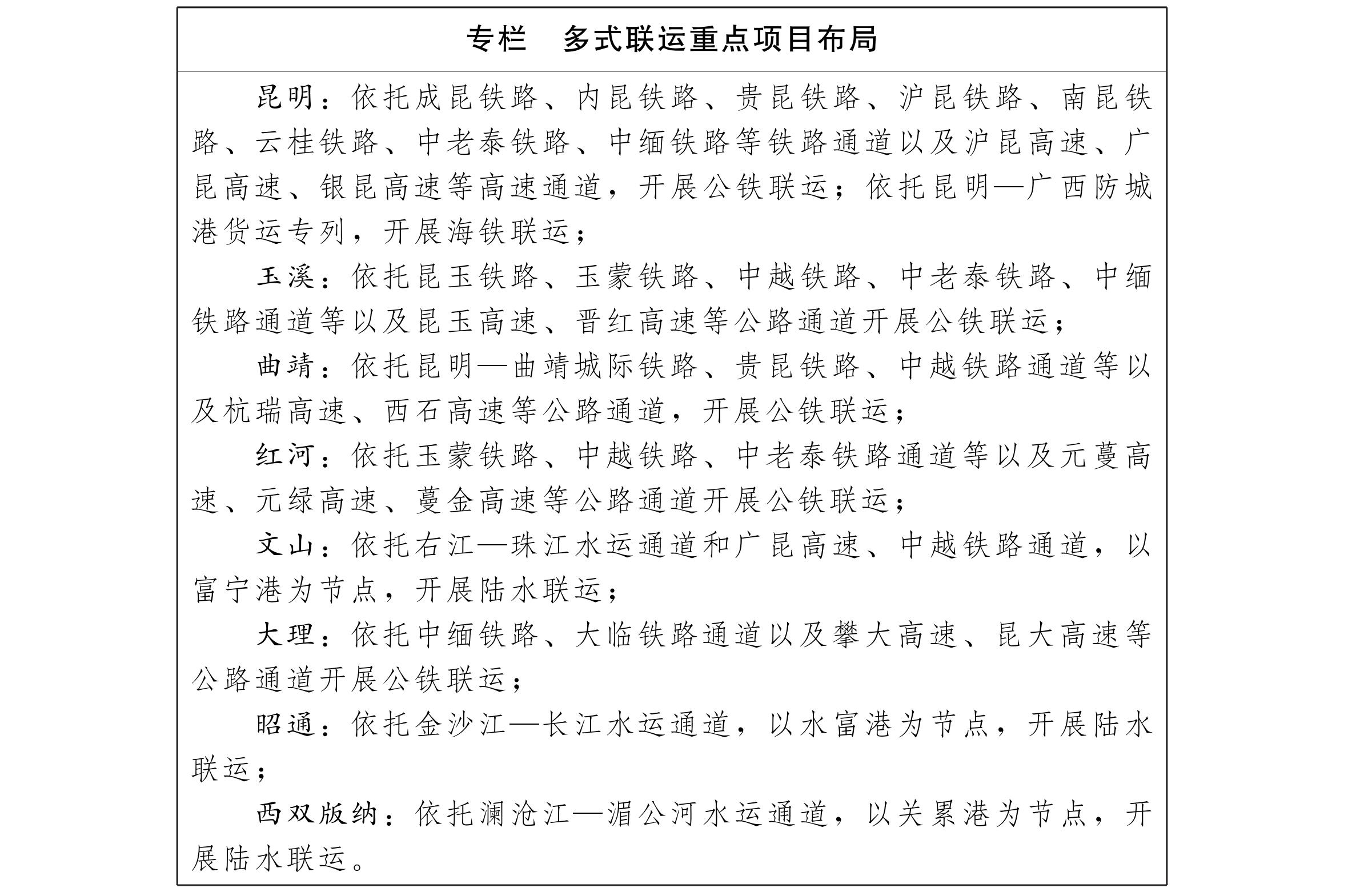
(B) Smart logistics engineering
Strengthen the application of advanced technologies such as Internet, Internet of Things, cloud computing and big data in modern logistics operation and management system, and build an intelligent logistics network. Promote logistics enterprises to use enterprise resource planning (ERP) and supply chain management (SCM) technologies, and improve the informationization level of logistics management of logistics enterprises. Support logistics enterprises to apply key technologies such as electronic identification, radio frequency identification, electronic data exchange, visualization, mobile information service and navigation integrated system, speed up the upgrading of logistics facilities and equipment, optimize the traditional logistics operation mode, and improve the automation, intelligence and operation efficiency of logistics operation. Encourage logistics enterprises to rely on the Internet to provide extended services to the upstream and downstream of the supply chain, and support supply chain management integrated service providers to build a smart supply chain management service system. Encourage logistics "double innovation", support the innovation and research and development of logistics technology and equipment and management mode, and strive to cultivate high-tech enterprises that provide technology and equipment research and development services for the development of modern logistics industry. Strengthen the research and development and application of logistics robots and other technologies to promote the application of robots in the logistics field.
Accelerate the construction of logistics public information platform, actively promote the development and utilization of logistics information resources in the whole society, support the development of logistics information platforms such as inventory monitoring, transportation stowage, tracking and tracing, cooperate with powerful key enterprises to build Yunnan international "modern logistics cloud" comprehensive information service platform, Yunnan cross-border logistics digital port and Yunnan agricultural integration big data platform, further improve the functions of intelligent transportation logistics public information platform, realize accurate docking of logistics supply and demand, and serve the development of modern logistics industry. Strengthen the safety management of logistics information, establish and improve relevant regulations and regulatory measures, support social organizations to carry out credit information service for logistics enterprises, and promote the formation of an environment and mechanism for the whole society to participate in supervision.
(3) E-commerce logistics project
Encourage and support business circulation enterprises to actively develop e-commerce, and vigorously develop e-commerce logistics focusing on characteristic agricultural products and cultural tourism products. Promote the construction of daily necessities and agricultural materials distribution network system in counties, townships and villages, build a number of specialized and socialized daily necessities and agricultural materials logistics distribution centers in key central towns, and promote the development of rural e-commerce logistics. Promote the construction of e-commerce logistics industrial park, build a fully automatic sorting express logistics base integrating intelligent warehousing, Internet of Things operation and logistics services, improve supporting services such as warehousing, sub-packaging, distribution and distribution, actively build an e-commerce logistics service platform, and realize online and offline linkage development. Encourage express delivery companies to cooperate with cross-border e-commerce companies in depth, set up branches in South Asian and Southeast Asian countries, and develop cross-border delivery services. We will build an express delivery network with Kunming as the core and cities such as Qujing, Dali and Honghe as the nodes, promote the second phase project of kunming changshui international airport Air Mail Processing Center, and build four express delivery parks, including Kunming first-class express delivery, Qujing third-class express delivery, Dali third-class express delivery and Pu ‘er city third-class express delivery. Support leading express delivery enterprises to become bigger and stronger, and by 2020, cultivate 3-4 leading express delivery enterprises with annual business income exceeding 500 million yuan.
(D) Cross-border logistics projects
Strengthen the construction of port logistics infrastructure, improve distribution processing, transportation, storage, transit, information processing and other supporting services, speed up the construction of logistics infrastructure, enhance the capacity of border ports, and enhance the distribution capacity of import and export goods. Establish a joint inspection mechanism for port logistics, fully realize the "one-stop" service window, and promote the implementation of the customs clearance operation mode of "early inspection, early customs declaration, inspection and release of goods upon arrival, and electronic release" to improve customs clearance efficiency. Accelerate the implementation of the "single window" policy. Encourage the construction of a number of special customs supervision zones, further improve the functions of existing special customs supervision zones such as Kunming and Honghe Comprehensive Bonded Zone, moderately expand the customs clearance scope of customs areas, actively expand entrepot trade, processing trade and other businesses, and promote the rapid development of bonded logistics. Support qualified logistics enterprises to set up offices and "overseas warehouses" in Vietnam, Laos, Myanmar, Thailand, Cambodia, India and Bangladesh to carry out international logistics business. Encourage and support enterprises inside and outside the province to carry out cross-border logistics business through ports.
(E) Cold chain logistics project
Focusing on the development orientation of building our province into a trading and logistics center of plateau agricultural products in China, we will vigorously develop cold chain logistics focusing on flowers, fruits and vegetables, wild edible fungi, meat and dairy products, and create a "72-hour cold chain logistics service circle" for plateau agricultural products facing the whole country. We will improve facilities such as pre-cooling at the place of origin, cold storage at the place of sale, fresh-keeping transportation and fresh-keeping processing, and realize seamless connection between cold chain logistics transportation and other links. Accelerate the construction of large-scale wholesale markets for agricultural products with plateau characteristics, and strengthen the construction of cold storage in the producing areas and distribution centers of agricultural products with plateau characteristics. Support the construction of seafood trading logistics center. Support the development of cold chain logistics enterprises, strengthen the capacity building of intelligent cold chain logistics, promote the use of energy-saving and environmental protection cold storage transportation equipment and temperature and humidity monitoring system, build low-temperature warehouses and distribution centers, and provide cold chain transportation guarantee for products with plateau characteristics such as agricultural products, medicines and seafood.
(6) Urban and rural distribution projects
Accelerate the improvement of urban and rural distribution network system, make overall planning and rational layout of three-level distribution network construction of intercity distribution centers, urban distribution centers and terminal distribution stations, and build a two-way logistics system between urban and rural areas. Relying on important transportation hubs and logistics distribution centers, we plan to build or upgrade a number of comprehensive logistics service parks integrating transportation, warehousing, distribution and information trading. Encourage the transformation and development of the railway freight yard in the central city into an urban distribution center. We will carry out urban joint distribution pilot projects, popularize the application of intelligent express (postal) boxes, integrate urban distribution capacity resources by using urban distribution Internet platform and vehicle networking technology, and improve urban logistics distribution service network. We will build cross-regional distribution centers for service chain enterprises and e-commerce enterprises, encourage trade circulation enterprises and logistics enterprises to cooperate, integrate logistics resources, improve common distribution capacity and reduce distribution costs. Promote the construction of new rural commercial centers, improve the rural logistics distribution service network, and solve the problem that it is difficult to buy and sell in rural areas. Vigorously promote rural e-commerce, encourage qualified e-commerce enterprises to build their own or cooperate with logistics and express delivery enterprises to build an integrated urban-rural distribution system.
(7) Demonstration Project of the Park
Actively promote the construction of logistics demonstration park, and promote the intensive development of logistics industry from point to area. Innovate the development mode of logistics parks, give full play to the market role, actively introduce large enterprises and social capital to participate in investment construction and operation, and at the same time strengthen cooperation with coastal developed areas such as Yangtze River Delta, Pearl River Delta and Beijing-Tianjin-Hebei, and explore the construction of parks in Southeast Asia Industrial Park and Zheshang Industrial Park. Support the construction of infrastructure and logistics information platform such as transshipment, three-dimensional warehousing and intelligent sorting in logistics parks, and improve service functions; Promote the integrated development of logistics parks and local advantageous industries, improve the ability and level of logistics elements gathering, and attract powerful logistics enterprises to settle in and develop. Focus on building 15 logistics demonstration parks in the province.
(eight) enterprise cultivation project
Implement the introduction strategy of leading logistics enterprises. Focusing on the top 500 enterprises in the world, the top 500 enterprises in China and the top 50 logistics enterprises in China, we will speed up the introduction of a number of large domestic and foreign logistics enterprises, and encourage large logistics enterprises and multinational logistics companies to set up headquarters or branches in our province to carry out domestic and foreign logistics business. Actively cultivate leading logistics enterprises in the province. Encourage the functional integration and business extension of existing traditional logistics enterprises such as warehousing and transportation, provide full supply chain services for manufacturing enterprises, and accelerate the transformation to modern logistics service providers and supply chain integrators. Encourage the joint development of logistics enterprises, commerce and manufacturing enterprises, optimize the management of logistics supply chain and extend the logistics value chain. Focusing on the development of plateau characteristic agricultural products, biomedicine, equipment manufacturing and other advantageous industries, we will focus on logistics enterprises with a good foundation of 3A and above in the province and encourage them to become bigger and stronger through mergers and acquisitions. Encourage the establishment of logistics enterprise alliances, carry out cross-regional logistics services, and support qualified enterprises to establish procurement centers, "overseas warehouses" and logistics distribution service networks in neighboring countries to carry out international logistics business. Encourage logistics enterprises to actively participate in the rating identification of A-level logistics enterprises.
VI. Safeguard measures
(A) policy measures
1. Land policy. The land for key logistics projects listed by the state and city in the "Thirteenth Five-Year Plan" for the development of modern logistics industry in our province shall be included in the planning and overall arrangement of logistics land when compiling or revising the overall land use planning. Tap the potential of existing logistics land, give policy support to the comprehensive development of existing logistics land, and improve the intensive utilization level of logistics land. Support the construction of logistics parks, and the proportion of all kinds of land to the total land area shall be implemented in accordance with national standards.
2. Fiscal policy. Increase financial investment in public goods and services of modern logistics industry, reduce highway toll standards for freight vehicles, and reduce the proportion of road crossing fees to transportation costs. Actively strive for central financial support, increase provincial financial input, and give support to key logistics projects. Guide and encourage social capital and financial capital to increase their support for the development of modern logistics industry, innovate investment methods, set up professional teams, and set up 2-3 Yunnan Modern Logistics Industry Development Funds funded by state-owned capital or local financial funds. According to the operation mode of "government guidance, market operation, professional management, risk dispersion and rolling development", support the construction of logistics parks, the cultivation of leading logistics enterprises, and the upgrading and upgrading of technical equipment of logistics enterprises.
3. Access policy. On the premise of ensuring safety, simplify the examination and approval procedures of logistics enterprises, formulate and promote the policy of "one photo and multiple addresses" and "one address and multiple photos" for industrial and commercial registration in logistics node cities, and solve the problem of establishing unincorporated branches such as business outlets and branches. We will further promote the reform of the commercial system in the logistics field, accelerate the implementation of "five certificates in one, one photo and one yard", "first photo and then certificate" and the commitment system, and simplify the handling procedures. Strictly review the business qualifications of transport enterprises, the technical conditions of transport vehicles and the qualifications of operators, and implement supervision and inspection measures. Establish a joint accountability mechanism for logistics parks, settled enterprises and drivers.
4. Transport management policy. Formulate the classification management mechanism of urban distribution vehicles, unify the standards and signs of urban distribution vehicles, and solve the problems of urban traffic, parking and loading and unloading operations of express delivery vehicles. Promote the distribution of vans, support joint distribution, simplify the licensing examination and approval procedures for freight LTL and urban distribution professional vehicles, and give priority to handling relevant operating licenses. Encourage the development of car-free carriers relying on the Internet platform, organize and carry out pilot projects for car-free carriers of road goods, and endow qualified car-free carriers with business qualifications. Promote the signing of China-Myanmar bilateral and China-Laos-Thailand trilateral automobile transportation agreements, promote the mutual recognition of cross-border transportation vehicle licenses, and improve the service guarantee level of cross-border transportation. Promote the construction of international road transport management and service information system, and provide convenience and guarantee for vehicles engaged in cross-border transport to go through entry and exit procedures and peers.
5. Investment and financing policies. Increase investment in modern logistics industry through multiple channels, support key areas and weak links of logistics through government investment, and encourage social capital to participate in the construction of modern logistics industry. Actively promote the sustained and healthy development of supply chain financial services. Guide banking financial institutions to increase credit support for logistics enterprises, especially small and micro logistics enterprises, promote non-cash payment tools, and provide convenient and efficient financing services for the development of modern logistics industry. Support qualified logistics enterprises to broaden financing channels by issuing corporate bonds, non-financial corporate debt financing instruments, corporate bonds and listing.
(2) Safeguard measures
1. Improve the coordination mechanism. All localities and relevant departments should establish a coordinated mechanism for the development of modern logistics industry with overall planning, duties, close cooperation and concerted efforts, formulate local plans or implementation plans scientifically and reasonably according to this plan, do a good job in the connection and cooperation of various special plans, strengthen the docking of logistics infrastructure such as logistics nodes and logistics channels, promote the development of "internet plus" efficient logistics, and ensure the effective implementation of the plan. Give full play to the role of the provincial modern logistics industry promotion group to ensure that the development planning and major construction projects of modern logistics industry are implemented.
2. Standardize the market order. Strengthen the supervision and management of the logistics market, give full play to the role of big data in the construction and operation of the logistics market supervision system, and improve the logistics operation monitoring, forecasting and early warning, and public service capabilities. Establish the credit system of logistics enterprises, improve the credit records of logistics enterprises and employees and the credit information disclosure mechanism of logistics industry, and incorporate them into the national enterprise credit information disclosure system and the website of Credit China. Enhance the awareness of corporate integrity, establish a cross-regional and cross-industry joint punishment mechanism, and increase the punishment for dishonesty. Strengthen logistics information security management, implement security management and technical protection measures for key links of network data, and prohibit disclosure of resale customer information. Strengthen the monitoring of logistics service quality satisfaction, and carry out activities to create safe, honest and high-quality services. Encourage logistics enterprises to integrate resources, strengthen cooperation, improve the level of intensive logistics operation, and reduce disorderly competition. Strengthen the supervision and inspection of competition in the logistics market, and investigate and deal with unfair competition and monopoly according to law.
3. Promote the application of standards. Accelerate the application of standardized logistics equipment and improve the universality and interchangeability of logistics equipment in the process of loading, unloading, handling and transportation. Promote the application of national standards and industry standards for logistics information and encourage the application of logistics operation standards. Encourage trade associations, scientific research institutions and enterprises to participate in the translation and revision of international standards or industry standards, and formulate local standards and enterprise standards in our province.
4. Strengthen safety supervision. Further standardize the business activities of logistics enterprises and put an end to illegal collection, transportation, storage and delivery of prohibited and dangerous goods. Strengthen the safety supervision of logistics enterprises, and urge enterprises to effectively fulfill the main responsibility of safety. Strengthen the inspection and testing of facilities, equipment and transport vehicles to ensure that the safety performance of vehicles reaches the standard and the equipment is in good condition. It is forbidden to overload transportation, and it is standardized to overload transportation. Establish and improve the information sharing mechanism of logistics safety supervision, and logistics enterprises should build information sharing technical interfaces according to unified standards, so as to facilitate logistics enterprises to accept unified supervision.
5. Strengthen statistical work. Strengthen the research on the index system and method system of logistics statistics in our province, scientifically divide the industry categories of modern logistics industry statistics, and establish a modern logistics industry statistical monitoring system. Do a good job in statistics, investigation and accounting of relevant indicators in the logistics industry, and constantly improve the quality of statistics. Actively explore the application of big data and cloud computing in statistics, analysis and monitoring of modern logistics industry, and provide support for macro decision-making and improving service efficiency.
6. Pay attention to talent support. Establish a collaborative innovation platform for modern logistics and supply chain, and jointly promote the development of modern logistics industry in our province through the cooperation of the government, enterprises and universities. Encourage enterprises to cooperate with universities, public service institutions and industry associations to set up training bases and R&D institutions to jointly cultivate compound professionals in the fields of Internet and logistics; Encourage and support the introduction of high-end talents in the international and domestic logistics field to provide high-level intellectual support for the development of modern logistics industry. Encourage and support the development of key disciplines and key laboratories of logistics management and engineering in colleges and universities.
Appendix 1. Spatial Layout of Modern Logistics Industry in Yunnan Province
2 provincial key logistics industrial park project list
3. List of provincial key cultivation logistics enterprises
List of 4 provincial key investment logistics enterprises
5. List of provincial key logistics platform projects
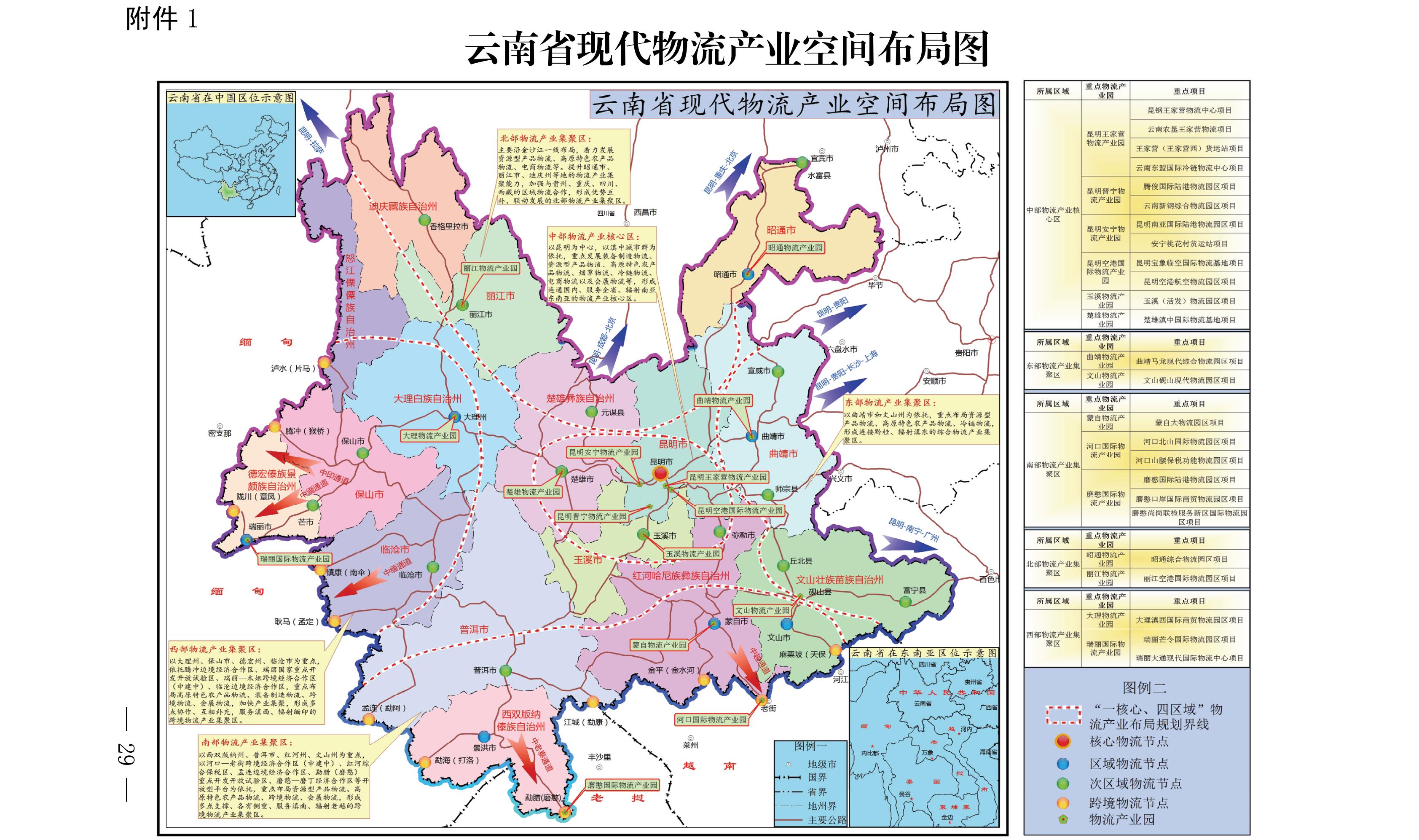
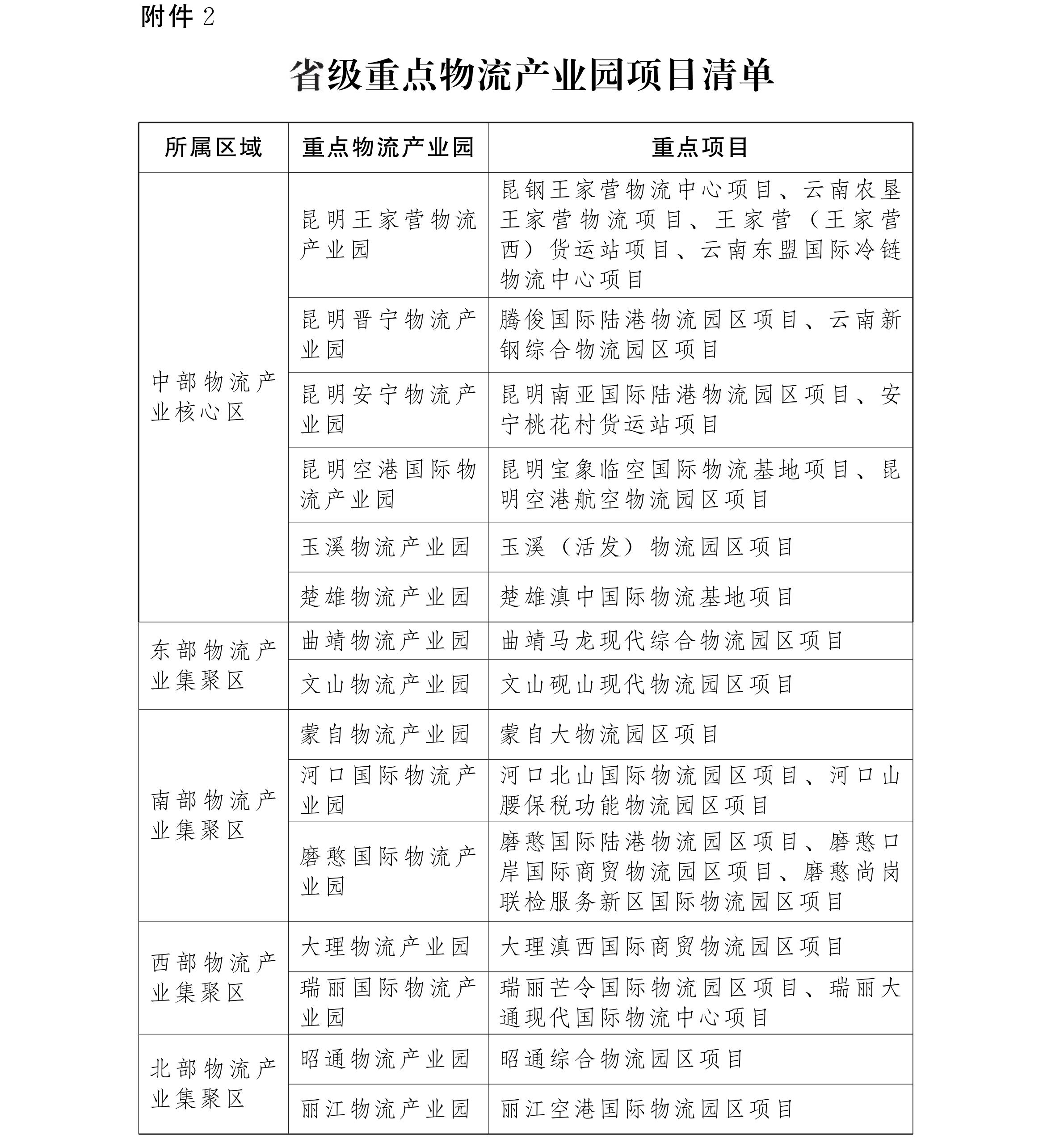
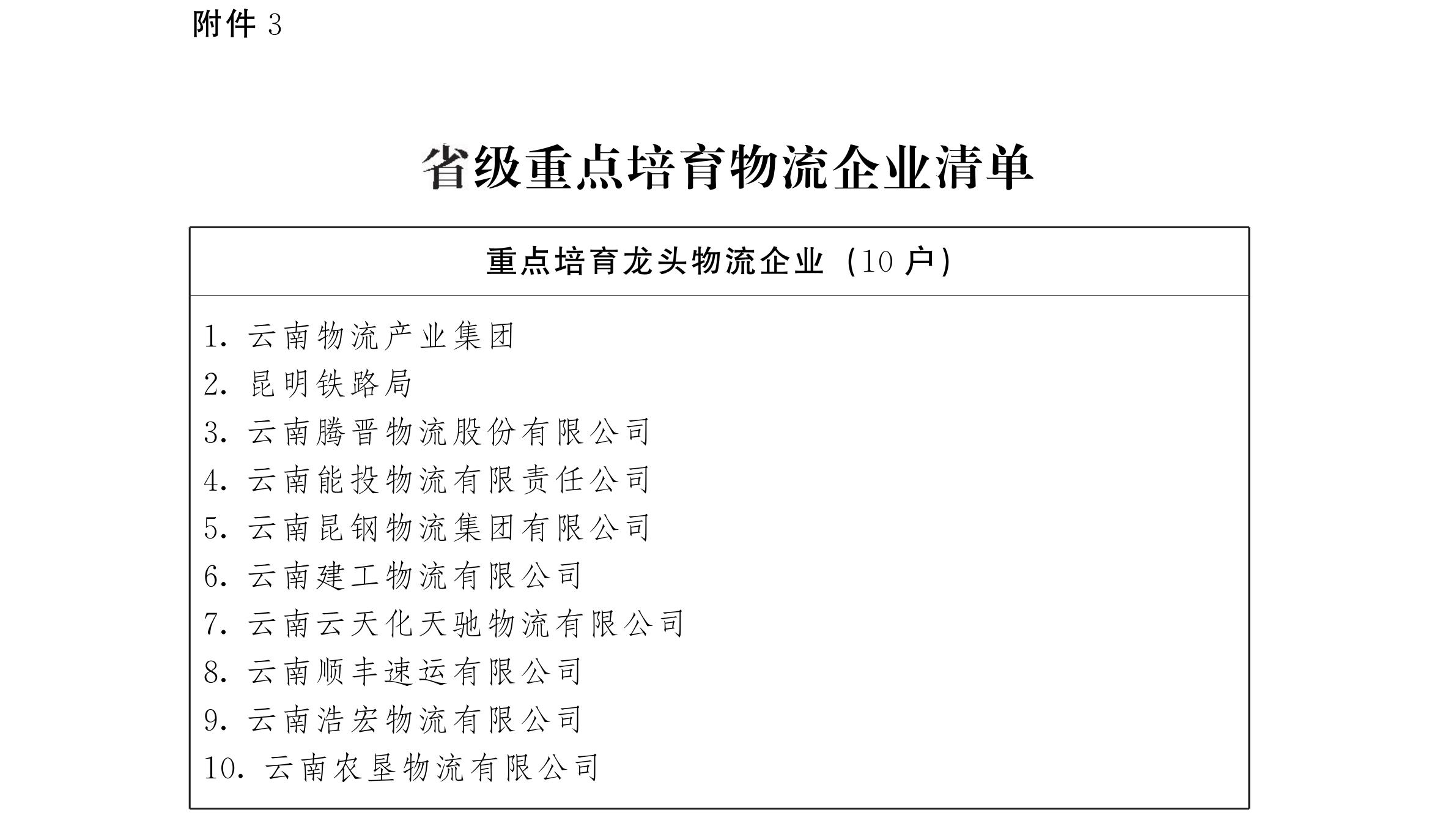
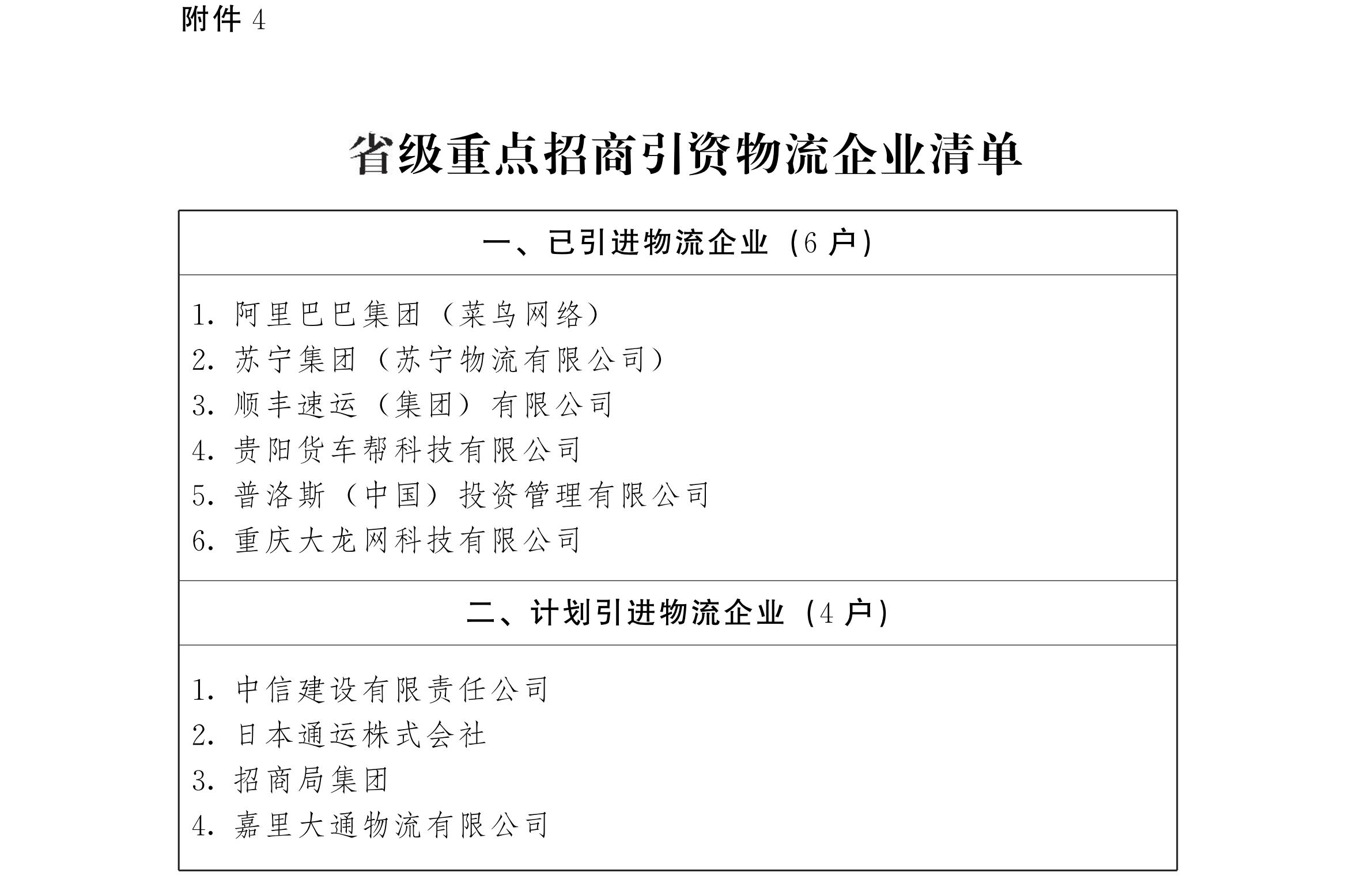
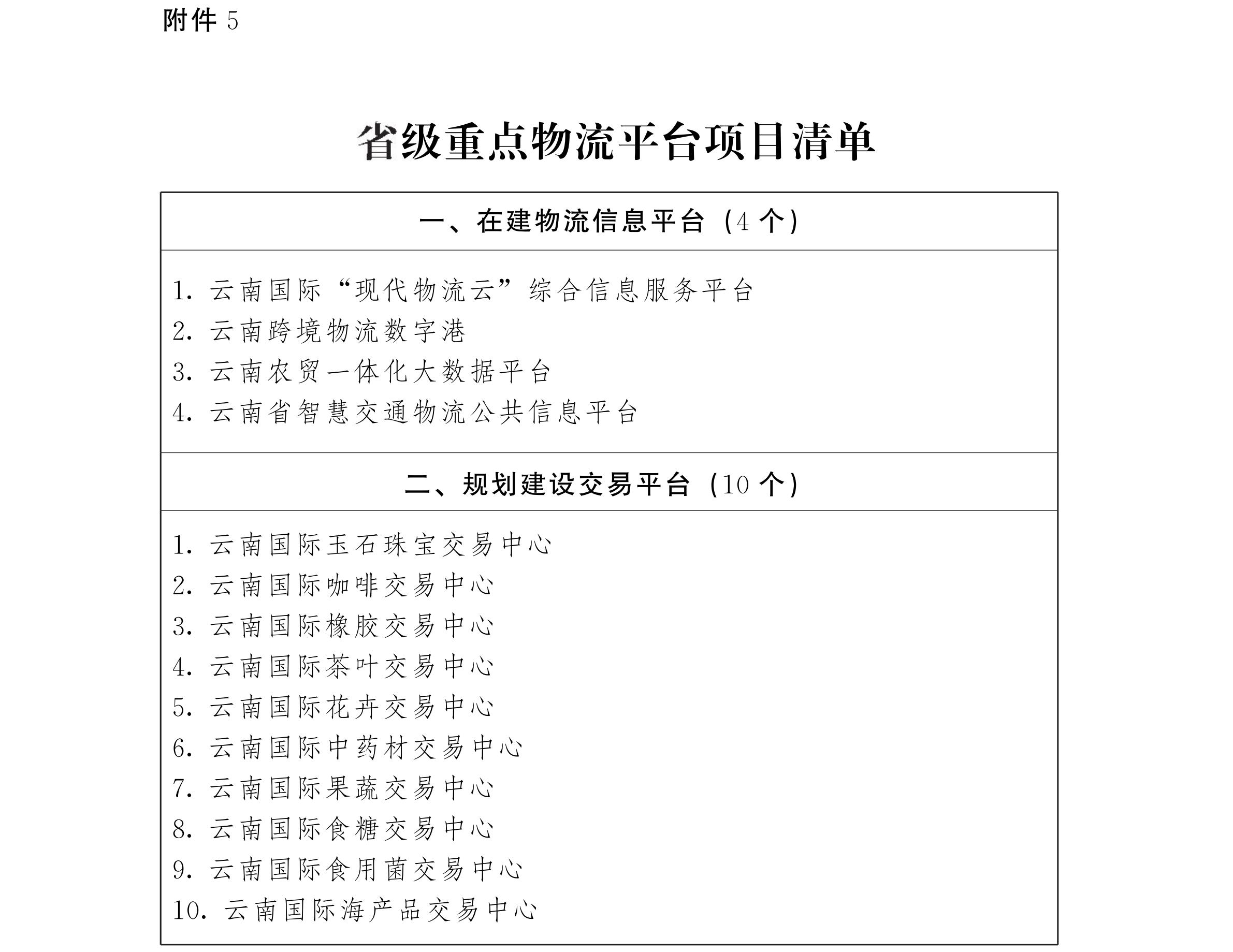
Implementation Plan of the 13th Five-Year Plan for the Development of Modern Logistics Industry in Yunnan Province (2016-2020)
In order to conscientiously implement the spirit of Several Opinions of Yunnan Provincial People’s Government of Yunnan Provincial Committee of the Communist Party of China on Promoting the Development of Key Industries (YF [2016] No.11), fully implement the Thirteenth Five-Year Plan for the Development of Modern Logistics Industry in Yunnan Province (hereinafter referred to as the Plan), and effectively promote the rapid development of modern logistics industry in our province, in accordance with the principle of "having goals, focusing, grasping hands and being able to implement"
First, the basic idea
Conscientiously implement the spirit of the 18th CPC National Congress and the Third, Fourth and Fifth Plenary Sessions of the 18th CPC Central Committee, thoroughly implement the series of important speeches by the Supreme Leader General Secretary and inspect the spirit of important speeches in Yunnan, establish and implement the development concept of innovation, coordination, green, openness and sharing around the decision-making arrangements of the CPC Central Committee, the State Council, the provincial party committee and the provincial government, base on the advantages of location, resources and openness of our province, and focus on active service and integration into the national development strategy. In accordance with the principle of "scientific layout, highlighting characteristics, facing high-end, leading by innovation, making key breakthroughs and leaping development", and focusing on optimizing network layout, cultivating industrial clusters, coordinating internal and external development, improving logistics efficiency, reducing logistics costs and facilitating people’s lives, we will accelerate the structural reform on the supply side, strive to establish and improve the supporting service system of modern logistics industry, and vigorously develop "internet plus" efficient logistics. Improve the level of logistics informatization, standardization, organization and intelligence, strive to build a regional international logistics center that is smooth in Yunnan, connects China and reaches South Asia and Southeast Asia, form a new pattern of modern logistics industry development with outstanding characteristics, complementary advantages and strong core competitiveness, and provide logistics service guarantee for building a radiation center facing South Asia and Southeast Asia and realizing the goal of building a well-off society in an all-round way in synchronization with the whole country.
Second, the overall goal
By 2017, the total social logistics in the province will reach about 4.6 trillion yuan, and the added value of the logistics industry will reach about 140 billion yuan. By 2020, the total social logistics in the province will reach about 6.3 trillion yuan, with an average annual growth rate of about 10.4%; The added value of the logistics industry is about 200 billion yuan, with an average annual growth rate of about 13%; The added value of logistics industry accounts for about 9.5% of GDP, and the added value of logistics industry accounts for about 19% of the added value of service industry. The ratio of total social logistics costs to GDP has dropped to less than 18%. Basically build a logistics infrastructure network that effectively connects various modes of transportation such as roads, railways, water transport and aviation pipelines, and continuously improve the logistics infrastructure; The role of modern logistics in economic and social development has been continuously enhanced, and the scale of logistics industry has steadily expanded; Basically establish a modern logistics service system with high efficiency, high quality, socialization, specialization and internationalization, and the level of logistics integration has been significantly improved; Traditional logistics, such as trade logistics and agricultural products logistics, have been growing, while emerging logistics, such as cold chain logistics and e-commerce logistics, have flourished, and the logistics industry system has been further improved; With the rapid development of third-party logistics, the competitiveness of leading logistics enterprises has been significantly enhanced, and the level of logistics specialization has been significantly improved.
III. Main tasks
(A) to strengthen the construction of logistics parks
According to the spatial layout and node planning of the province’s logistics industry, combined with the province’s economic and social development level, location and transportation advantages and actual logistics demand, from the perspective of supporting the development of modern logistics industry, and in accordance with the principle of "moderate scale, cluster development, revitalizing stocks, making big increments, grasping large ones and letting small ones go", we will rationally arrange and focus on building 15 provincial-level logistics industrial parks to give full play to the agglomeration effect and radiation-driven role of industries. Guarantee the land for logistics, and provide land guarantee for key logistics industrial park projects listed in the "Thirteenth Five-Year Plan for the Development of Modern Logistics Industry in Yunnan Province" by various states and cities; For the existing logistics land, give comprehensive development land policy support and improve the intensive utilization level of logistics land. Innovate the development mode of logistics parks and encourage powerful enterprises and social capital to participate in investment, construction and operation. Strengthen the infrastructure around the park, especially the construction of collection and distribution channels, support the integration and development of logistics parks and local advantageous industries, and introduce powerful logistics enterprises to settle in and develop. Formulate evaluation and management measures for provincial logistics demonstration parks, focus on cultivating and evaluating 15 provincial logistics demonstration parks throughout the province, and support their infrastructure construction such as transshipment, warehousing, sorting and packaging, and information and standardization construction. Support the creation of a national logistics demonstration park. (led by the Provincial Department of Commerce and the Development and Reform Commission; Provincial Commission of Industry and Information Technology, Department of Land and Resources, Department of Housing and Urban-Rural Development, Department of Transportation, Yunnan Airport Group, kunming railway administration, with the cooperation of relevant state and municipal people’s governments).
(2) Accelerate the development of multimodal transport.
Promote the development of comprehensive transportation, speed up the construction of multimodal transport transit facilities, promote the construction of transit points with container multimodal transport as the core, and build a multimodal transport collection and distribution network system based on public rail transport. Support the development of public-rail combined transport in Kunming, Qujing, Yuxi, Honghe, Dali and other States and cities, develop land-water combined transport in Zhaotong, Wenshan, Xishuangbanna and other States and cities, establish transit combined transport hubs, and improve the collection and distribution network. Support qualified logistics parks to build special railway lines, and encourage and support logistics enterprises to carry out container multimodal transport business. Vigorously develop the mode of transportation, and promote the development of multimodal transport, enterprise alliance and car-free transportation. Explore the implementation of "one vote to the end" intermodal service to promote online opening and real-time trading of warehousing resources. Establish a multimodal transport coordination mechanism involving transportation, railways, aviation, ports, customs, inspection and quarantine departments, support the construction of a multimodal transport public information platform, promote information exchange and sharing, and establish and improve multimodal transport rules and full service specifications. Actively promote the development of container multimodal transport from our province to Europe, South Asia and Southeast Asia, strengthen cooperation with coastal ports such as Shanghai Port, Suzhou Port, Qingdao Port and Guangzhou Port, and vigorously develop sea-rail combined transport. (Provincial Industry and Information Technology Commission and Transportation Department take the lead; Provincial Development and Reform Commission, Department of Land and Resources, Department of Commerce, Quality Supervision Bureau, Yunnan Airport Group, kunming railway administration, with the cooperation of relevant state and municipal people’s governments)
(3) Actively develop e-commerce logistics.
We will implement a comprehensive demonstration of e-commerce in rural areas, a provincial pilot of e-commerce in rural areas and a three-year action plan of e-commerce to prosper the border and enrich the people, build a cross-border e-commerce service platform, and improve the e-commerce service system. Encourage and support business circulation enterprises to actively develop e-commerce, and rely on the advantages of their own distribution network to promote the integration of online and offline development. Encourage and support e-commerce enterprises to cooperate with postal, express and logistics enterprises, rationally arrange and build e-commerce logistics distribution centers, distribution centers and terminal sites in cities, and improve the urban e-commerce logistics distribution network; We will build a number of specialized and socialized distribution centers for daily necessities and agricultural materials, distribution centers and agricultural products distribution centers in key towns, improve the rural e-commerce logistics service network by relying on postal outlets, rural shops in thousands of villages and thousands of townships, and build a two-way logistics service system for industrial products going to the countryside and agricultural products entering the city. Promote the construction of e-commerce logistics industrial park and guide the agglomeration and development of e-commerce, express delivery and LTL logistics enterprises. Encourage express delivery companies and cross-border e-commerce companies to cooperate in depth, set up branches in South Asia and Southeast Asia, and develop cross-border delivery services. We will build an express delivery network with Kunming as the core and cities such as Qujing, Dali and Pu ‘er as the nodes, promote the second phase project of kunming changshui international airport Air Mail Processing Center, build four express delivery parks such as Kunming first-class express delivery, Qujing third-class express delivery, Dali third-class express delivery and Pu ‘er city third-class express delivery, and cultivate 3-4 leading express delivery enterprises with annual business income exceeding 500 million yuan. (led by the Provincial Department of Commerce; Provincial Development and Reform Commission, Industry and Information Technology Commission, Transportation Department, Housing and Urban-Rural Construction Department, Yunnan Airport Group,Provincial Postal Administration, with the cooperation of state and municipal people’s governments)
(D) Focus on improving cross-border logistics.
Strengthen port infrastructure construction, and rationally plan and build cross-border logistics parks at the first-class and second-class ports in the province. Promote the coordinated development of special customs supervision areas, land port and ports. Vigorously promote the facilitation of port customs clearance, promote the construction of "single window" on the basis of the electronic port customs clearance service platform, carry out "joint inspection and one-time release" of port supervision, realize "information exchange, mutual recognition of supervision and mutual assistance in law enforcement" of port supervision departments, improve customs clearance efficiency and reduce customs clearance costs. Actively promote the construction of special customs supervision zones such as Kunming and Honghe Comprehensive Bonded Zone, support enterprises in the zone to actively carry out processing trade, entrepot trade, market procurement and other businesses, and accelerate the development of bonded logistics. Promote the steady development of China (Yunnan) European trains. Encourage logistics enterprises to expand their international business, support qualified logistics enterprises to establish "overseas warehouses" and logistics transportation networks in Vietnam, Laos, Myanmar, Thailand, Cambodia and other countries, and build multinational logistics enterprises with international competitiveness. Encourage and support enterprises inside and outside the province to carry out cross-border logistics business through Yunnan port. Promote the signing of China-Myanmar bilateral and China-Laos-Thailand trilateral automobile transportation agreements, actively seek the support of relevant state ministries and commissions, promote the mutual recognition of vehicle licenses for facilitating transportation and cross-border transportation, and improve the service guarantee level of cross-border transportation. (led by the Provincial Department of Commerce; Provincial Development and Reform Commission, Public Security Department, Department of Transportation, Yunnan Airport Group, kunming railway administration, Kunming Customs, Yunnan Entry-Exit Inspection and Quarantine Bureau, Provincial Postal Administration, and relevant state and municipal people’s governments)
(E) Vigorously develop cold chain logistics.
In Kunming, Qujing, Yuxi, Chuxiong, Dali and other major producing areas of plateau agricultural products, we will accelerate the construction of large-scale wholesale markets for plateau agricultural products, support the construction of logistics bases for plateau agricultural products, promote the integrated development of wholesale trading and logistics of plateau agricultural products, and build a trading and logistics center for plateau agricultural products in China. Focus on developing cold chain logistics in the circulation fields of flowers, fruits and vegetables, wild mushrooms, meat, dairy products, aquatic products, seafood and medicines. Strengthen the capacity building of intelligent cold chain logistics, guide and support enterprises to use various new cold chain logistics equipment and technologies, improve facilities such as pre-cooling, cold storage and fresh-keeping transportation and processing, and solve the problem of seamless connection between cold chain logistics transportation and other links. We will carry out pilot projects for the development of cold chain logistics focusing on flowers, fruits and vegetables, support pilot logistics enterprises to purchase energy-saving and environmentally-friendly cold chain transport vehicles, promote automatic temperature and humidity monitoring systems and control equipment throughout the process, establish warehouses or distribution centers for freezing, refrigeration and preservation, and enhance the cold chain transport service capacity of enterprises. On the basis of the pilot, cultivate and expand a number of professional cold chain logistics enterprises. (Provincial Development and Reform Commission takes the lead; Provincial Commission of Industry and Information Technology, Department of Transportation, Department of Agriculture, Department of Commerce, Quality Supervision Bureau, kunming railway administration, with the cooperation of relevant state and municipal people’s governments).
(6) Promote the coordinated development of logistics industry and manufacturing industry.
Encourage manufacturing enterprises in steel, non-ferrous metals, equipment, chemicals, biomedicine and other industries to divest their logistics business, promote the logistics socialization of manufacturing enterprises, improve the intensive level of logistics resources, and reduce the logistics cost of manufacturing enterprises. Support logistics enterprises separated from manufacturing enterprises to improve the level of technology and equipment, and provide professional and lean public logistics services for the society. Encourage equipment manufacturing, biomedicine and other industrial clusters to adopt the "park in the park" model, build logistics parks or public warehouses, and introduce third-party logistics enterprises. Encourage the joint development of logistics enterprises and manufacturing enterprises, support logistics enterprises to build warehousing and distribution facilities and logistics information platforms that are closely matched and effectively connected with manufacturing enterprises, improve the supply chain management capabilities for manufacturing enterprises, and provide manufacturing enterprises with integrated services such as supply chain planning, procurement logistics, incoming logistics, delivery logistics, recycling logistics, supply chain finance and information traceability. (Provincial Industry and Information Technology Commission takes the lead; Provincial Development and Reform Commission, Department of Commerce, State-owned Assets Supervision and Administration Commission, and relevant state and municipal people’s governments)
(7) Building a smart logistics system
Accelerate the development of "internet plus" efficient logistics, strengthen the application of advanced information technologies such as Internet, big data and cloud computing in the logistics field, and vigorously develop new efficient and convenient logistics modes such as "internet plus" vehicle-cargo matching, "internet plus" capacity optimization, "internet plus" transportation coordination, "internet plus" warehousing transaction, "internet plus" supply chain management and "internet plus" urban and rural distribution, so as to promote the supply of goods, vehicles and transportation. Support logistics enterprises to apply key technologies such as electronic identification, radio frequency identification, electronic data exchange, visualization, mobile information service and navigation integrated system, speed up the upgrading of logistics facilities and equipment, optimize the traditional logistics operation mode, and improve the automation, intelligence and operation efficiency of logistics operation. Encourage logistics enterprises to rely on the Internet to provide extended services to the upstream and downstream of the supply chain, and support supply chain management integrated service providers to build a smart supply chain management service system. Encourage supply chain management enterprises to adopt big data, cloud computing, Internet of Things and other technologies to improve the integrated logistics services of supply chain. Promote the combination of logistics and "double innovation", encourage and support innovative research and development of logistics technology, operation management mode and equipment, and focus on introducing or cultivating high-tech enterprises specializing in research and development of new logistics technologies, design and management of logistics supply chain and manufacturing of advanced logistics equipment. Strengthen the research and development and application of logistics robots and other technologies to promote the application of robots in the logistics field. (led by the Provincial Department of Commerce and the Development and Reform Commission;Provincial Commission of Industry and Information Technology, Department of Science and Technology, Department of Transportation, China Merchants Cooperation Bureau, kunming railway administration, Provincial Postal Administration, with the cooperation of the people’s governments of various states and municipalities).
(eight) to promote the integration of urban and rural distribution.
Overall planning and construction of intercity distribution centers, urban distribution centers, street (community) distribution sites, and improvement of urban three-level distribution networks. Relying on important transportation hubs and logistics distribution centers, we plan to build or upgrade a number of comprehensive logistics service parks integrating transportation, warehousing, distribution and information trading. Encourage the transformation and development of the railway freight yard in the central city into an urban distribution center. Support the construction of urban terminal distribution points and vigorously develop intelligent express boxes. Actively carry out urban joint distribution, encourage transportation, business circulation, e-commerce, logistics and distribution enterprises to strengthen cooperation, integrate available logistics resources, improve joint distribution capacity, and cooperate with chain enterprises to carry out unified distribution. Promote the use of energy-saving distribution vehicles and promote the standardization and identification of urban distribution vehicles. Promote logistics enterprises, e-commerce enterprises, postal enterprises, supply and marketing cooperatives, etc. to make full use of existing logistics resources to carry out in-depth cooperation, promote the construction of county-level warehousing and distribution centers and rural logistics express delivery points, and improve the county, township and village three-level logistics distribution network. Promote the construction mode of new rural commercial centers and build a logistics distribution network that is suitable for new urban and rural formats such as new rural commercial centers. Guide logistics enterprises to extend and expand supply chain services, provide customized services such as sorting, packaging, warehousing and transportation for characteristic agricultural products, and improve the intensive utilization level of logistics infrastructure. (led by the Provincial Department of Commerce; Provincial Public Security Department, Department of Transportation, Quality Supervision Bureau, Federation of Supply and Marketing Cooperatives, Provincial Postal Administration Bureau, with the cooperation of state and municipal people’s governments)
(9) Cultivate leading logistics enterprises
Focus on the world’s top 500, China’s top 500 enterprises and China’s top 50 logistics enterprises, and introduce a number of large international and domestic logistics enterprises. Encourage large domestic logistics enterprises and multinational logistics companies to set up headquarters or branches in our province. Encourage key logistics enterprises in the province to become bigger and stronger through various forms such as equity participation, holding, merger, alliance, joint venture and cooperation, support alliance cooperation and group development of small and medium-sized logistics enterprises, and accelerate the cultivation of fourth-party logistics enterprises with supply chain design and consulting management capabilities. Encourage and support logistics enterprises in the province to introduce advanced logistics technology, speed up the upgrading of logistics facilities and equipment, participate in or invest independently in the construction of logistics parks, and improve the international and domestic competitiveness of enterprises. Encourage and support powerful logistics enterprises to "go global" to expand the logistics service network and development space, and cooperate with cross-border e-commerce enterprises and traditional foreign trade enterprises to develop. Encourage logistics enterprises to develop exhibition logistics by relying on special exhibition brands such as "South Expo", "Travel Fair" and "Cultural Fair". Actively promote logistics enterprises to participate in the evaluation of higher-level A-level enterprises. Study and formulate measures for the identification and management of provincial leading logistics enterprises, evaluate a number of provincial leading logistics enterprises every year, implement dynamic management and give inclined support to them. By 2020, 2-3 new 5A-level logistics enterprises and 6-8 new 4A-level logistics enterprises will be cultivated. (Provincial Department of Commerce, China Merchants Cooperation Bureau, Development and Reform Commission, Commission of Industry and Information Technology, Department of Transportation, State-owned Assets Supervision and Administration Commission, Provincial Federation of Logistics and Purchasing, Logistics Society, and the people’s governments of various states and cities are responsible)
(10) Building a logistics information platform
Support logistics enterprises to establish logistics information platforms such as inventory monitoring, transportation stowage, tracking and tracing, and use enterprise resource planning (ERP) and supply chain management (SCM) technologies to improve the informationization level of enterprise logistics management. Build an interconnection and sharing system of logistics information, promote the development and utilization of logistics information resources in the whole society, integrate the existing resources of various social information platforms, build an international "modern logistics cloud" comprehensive information service platform in Yunnan, realize the interconnection and intercommunication of information with regulatory authorities, governments at all levels, financial institutions, production enterprises, commercial enterprises, e-commerce enterprises and logistics enterprises, and promote the formation of "three-in-one" information flow, capital flow and goods flow. Encourage logistics platform operators to expand the social service function of specialized platforms, promote various cooperation modes such as "platform+logistics transaction", "platform+supply chain collaboration", "platform+cross-border e-commerce" and "platform+financial insurance", and cooperate with Guiyang Truck Help Technology Co., Ltd. to build Yunnan cross-border logistics digital port and Yunnan farmers’ integrated big data platform, and improve Yunnan smart transportation logistics public information platform. Use big data to strengthen the service and supervision of market players, and improve the logistics operation monitoring, forecasting and early warning, and public service capabilities. (Provincial Department of Commerce, Industry and Information Technology Commission take the lead; Provincial Development and Reform Commission, Department of Transportation, Yunnan Airport Group, kunming railway administration, Provincial Postal Administration, and relevant state and municipal people’s governments)
(eleven) improve the level of logistics standardization.
Strengthen basic scientific research on logistics standardization and promote logistics standardization in key areas, key industries and enterprises. Support logistics enterprises to popularize and apply standardized logistics facilities and equipment such as standard pallets, vans, containers, loading and unloading equipment, shelves and measuring instruments, and adopt standardized logistics information systems and work processes to carry out standardized logistics operations. Encourage industry associations, scientific research institutions and logistics enterprises in the province to participate in the translation and revision of international standards or industry standards, and promote the application of national standards and industry standards for logistics information. (Provincial Quality Supervision Bureau, Development and Reform Commission, Industry and Information Technology Commission, Department of Transportation, Department of Commerce, Provincial Logistics Society and Federation of Logistics and Purchasing are responsible)
(12) Improve the emergency logistics system.
Plan to establish an emergency logistics system with unified coordination, quick response, orderly operation, high efficiency and reliability, and military-civilian linkage, and improve the military-civilian emergency logistics linkage mechanism. Select logistics enterprises with emergency logistics operation ability, support them to build emergency storage, transit and distribution facilities at important logistics nodes and carry out emergency logistics drills in a timely manner. Accelerate the construction of general airport, and build emergency storage, transit and distribution facilities to give full play to the role of emergency logistics support of general airport. (Provincial Development and Reform Commission takes the lead; Yunnan Military Region, Provincial Department of Transportation, Department of Commerce, Yunnan Airport Group, kunming railway administration, with the cooperation of state and municipal people’s governments)
(13) Improve fiscal and taxation support policies.
Increase financial support at the provincial level, and give support to the construction of key logistics public service platforms, the construction of multimodal transport infrastructure, the promotion of logistics standardization facilities and equipment, the research and application of advanced logistics technology and logistics equipment, the cultivation of provincial logistics demonstration parks and leading logistics enterprises, and statistical monitoring. Actively strive for central financial support and give support to key logistics projects implemented in the province. Guide and encourage social capital and financial capital to increase their support for the development of modern logistics industry, set up 2-3 Yunnan Modern Logistics Industry Development Funds funded by state-owned capital or local financial funds, and increase investment in key logistics enterprises and logistics park projects according to the operation mode of "government guidance, market operation, professional management, decentralized risk and rolling development". Strictly implement the "green traffic" policy of the state and our province to reduce logistics costs. Fully implement the current preferential tax policies of the state to promote the healthy development of logistics enterprises, increase the publicity of relevant tax policies, take the initiative to do a good job in tax service for logistics enterprises, implement the VAT deduction policy in strict accordance with relevant state regulations, and reduce the tax burden of logistics enterprises. (Provincial Department of Finance, Development and Reform Commission, Department of Transportation, Department of Commerce, Local Taxation Bureau, Provincial State Taxation Bureau)
(14) Increase financial support.
Guide banking financial institutions to increase credit support for logistics enterprises, especially small and micro logistics enterprises, give priority to granting loans to logistics enterprises and projects that meet credit conditions, increase credit lines for competitive, marketable, profitable and reputable logistics enterprises, reasonably match loan terms, and innovate products and guarantee methods to help logistics enterprises become bigger and stronger; Promote non-cash payment tools under controllable risks, and provide convenient and efficient financing services for the development of modern logistics industry. Support qualified logistics enterprises to broaden financing channels by issuing corporate bonds, debt financing tools for non-financial enterprises and listing. Encourage insurance funds to serve the development of logistics industry and the construction of major logistics projects through equity, bonds, funds and asset securitization. Support the logistics information public service platform to improve the functions of online transaction and online payment, promote the integration of financial products with logistics and information flow, and accelerate the development of supply chain finance. (Provincial Finance Office, Development and Reform Commission, Kunming Central Branch of the People’s Bank of China, Yunnan Banking Regulatory Bureau, Yunnan Securities Regulatory Bureau and Yunnan Insurance Regulatory Bureau are responsible for the division of responsibilities)
(15) Strengthen statistical work.
Strengthen the research on the theory and method of logistics statistics, clarify the basic concept of logistics statistics, scientifically classify the statistical industry categories of modern logistics industry according to the actual situation in our province, scientifically set statistical indicators, and establish the statistical monitoring system of modern logistics industry in our province. Actively explore the application of big data and cloud computing in the statistics, analysis and monitoring of logistics industry, and establish a monitoring platform for the statistical operation of modern logistics industry in our province in a timely manner. Do a good job in statistics, investigation and accounting of relevant indicators of modern logistics industry in the province, and continuously improve the quality of statistics, so as to provide reference and basis for government decision-making, industry management and enterprise management decision-making. (Provincial Bureau of Statistics and Department of Commerce take the lead; Provincial Development and Reform Commission, Industry and Information Technology Commission, Transportation Department, Local Taxation Bureau, Yunnan Airport Group, kunming railway administration, Kunming Customs, Provincial State Taxation Bureau, Provincial Postal Administration, Provincial Federation of Logistics and Purchasing, Logistics Society, with the cooperation of the people’s governments of various states and cities).
(sixteen) to strengthen the training and introduction of talents.
Support school-enterprise cooperation, build modern logistics industry education bases in qualified universities, train logistics talents at different levels, and carry out order-based logistics personnel training; Establish Industry-University-Research base and practice base in key logistics enterprises. Encourage and support the development of key disciplines and key laboratories of logistics management and engineering in colleges and universities. Encourage and support the introduction of high-end talents in the international and domestic logistics field to provide intellectual support for the development of modern logistics industry. (Provincial Department of Commerce, Department of Education, Department of Human Resources and Social Security, Department of Science and Technology, Department of Transportation, Yunnan University, Provincial Postal Administration Bureau, Provincial Logistics Society, and state and municipal people’s governments are responsible)
(seventeen) support the development of industry intermediary organizations.
Strengthen the construction of intermediary organizations in the logistics industry. Give full play to the role of logistics associations, societies and other industry intermediary organizations, strengthen industry self-discipline, establish a logistics industry credit system, standardize the behavior of logistics enterprises, and promote the healthy development of the industry. Support industry associations to provide services such as subject research, statistical analysis, consultation and evaluation, personnel training, and promotion of industry standards to enhance their own development capabilities. (The member units of the provincial modern logistics industry promotion group are responsible for the state and municipal people’s governments)
(eighteen) optimize the development environment.
Strictly implement the national and provincial administrative charging policies for enterprises, and comprehensively clean up various charging items for logistics enterprises. We will implement preferential policies for tolls for more than three types of transport vehicles engaged in cross-border logistics business. Encourage enterprises to integrate resources, strengthen cooperation, improve the level of intensive logistics operation, and reduce disorderly competition. Strengthen the supervision and inspection of competition in the logistics market, and investigate and deal with unfair competition and monopoly according to law. Simplify the examination and approval procedures for the establishment of logistics enterprises, formulate and promote the policy of "one photo and multiple addresses" and "one address and multiple photos" for industrial and commercial registration in logistics node cities, and solve the problem of establishing unincorporated branches such as business outlets and branches. We will further promote the reform of the commercial system in the logistics field, accelerate the implementation of "five certificates in one, one photo and one yard", "first photo and then certificate" and the commitment system, and simplify the handling procedures. Promote the distribution of vans, support joint distribution, simplify the licensing examination and approval procedures for freight LTL and urban distribution professional vehicles, and give priority to handling relevant operating licenses. Encourage the development of car-free carriers relying on the Internet platform, organize and carry out pilot projects for car-free carriers of road goods, and endow qualified car-free carriers with business qualifications. Formulate the classification management mechanism of urban distribution vehicles, unify the standards and signs of urban distribution vehicles, and solve the problems of urban traffic, parking and loading and unloading operations of express delivery vehicles. Study and implement measures for charging freight vehicles without stopping. Establish the credit system of logistics enterprises, rely on the social credit information sharing platform, integrate the data resources of industry associations and specialized business platforms, gradually establish the credit files of relevant entities in the industry, and improve the credit records of logistics enterprises and employees.Incorporate it into the national enterprise credit information publicity system and the "Credit China" website, enhance the enterprise credit awareness, strengthen the monitoring of logistics service quality satisfaction, and increase the punishment for dishonesty. (Provincial Administration for Industry and Commerce, Development and Reform Commission, and Transportation Department take the lead; Provincial Committee of Industry and Information Technology, Public Security Department, Department of Commerce, Quality Supervision Bureau, Provincial Federation of Logistics and Purchasing, with the cooperation of state and municipal people’s governments)
(nineteen) to strengthen safety supervision.
Strengthen the safety supervision of logistics enterprises, and urge enterprises to effectively fulfill the main responsibility of safety. Strictly review the business qualifications of transport enterprises, the technical conditions of transport vehicles and the qualifications of operators, and implement supervision and inspection measures. Strengthen the inspection and testing of facilities, equipment and transport vehicles to ensure that the safety performance of vehicles reaches the standard and the equipment is in good condition. Further standardize the business activities of logistics enterprises and put an end to illegal collection, transportation, storage and delivery of prohibited and dangerous goods. It is forbidden to overload transportation, and it is standardized to overload transportation. Establish a joint accountability mechanism for logistics parks, settled enterprises and drivers. Strengthen logistics information security management, focus on establishing and improving logistics information security management mechanism from the aspects of network credit, network supervision, emergency response, information security assessment, disaster recovery, etc., and urge logistics enterprises to build information sharing technology interfaces according to unified standards to facilitate unified supervision. It is forbidden to disclose resale customer information. (The provincial comprehensive management office takes the lead; Provincial Public Security Department, Safety Supervision Bureau, Transportation Department, Development and Reform Commission, Department of Commerce, kunming railway administration, Provincial Postal Administration and other departments to cooperate)
(twenty) improve the coordination mechanism.
Establish a modern logistics industry development promotion mechanism with horizontal linkage, vertical coordination, respective duties and concerted efforts in the whole province. Formulate information notification, supervision and inspection, responsibility assessment and other systems for the promotion of modern logistics industry, establish a linkage promotion mechanism for major projects and key tasks of provinces, prefectures and cities and a contact system for key enterprises, clarify work responsibilities, strengthen the implementation of responsibilities, and form a joint effort of unified management and coordinated promotion. (led by the Provincial Department of Commerce; The member units of the provincial modern logistics industry promotion group, with the cooperation of the state and municipal people’s governments)
Fourth, organize the implementation
All localities and relevant departments should fully understand the great significance of accelerating the development of modern logistics industry, conscientiously implement the division of responsibilities, and accelerate the implementation of work. The provincial modern logistics industry promotion group should earnestly shoulder the overall responsibility of organization and leadership, overall coordination and lead management; The main departments should actively take responsibility and take the initiative to implement the responsibilities of leading coordination and promoting; The cooperation departments should perform their respective duties, actively cooperate, and make joint efforts to do all the work. The people’s governments of prefectures and cities should strengthen organization and coordination, formulate plans to promote the implementation in light of the actual situation, clearly lead and focus on the departments, focus on the construction of key parks, the implementation of key projects and the cultivation of key enterprises that are included in the provincial planning within their administrative areas, and form a joint effort of overall coordination, division of labor and cooperation, smooth implementation, up-and-down linkage and strong promotion to ensure the completion of various objectives and tasks.











